The government has appointed a new taskforce to drive forward the hunt for a coronavirus vaccine and prepare industry to manufacture it at scale once it is developed.
Led by the chief scientific adviser, Sir Patrick Vallance, and the deputy chief medical officer, Jonathan Van-Tam, the Vaccine Taskforce will coordinate efforts to find a vaccine, funnel resources and support to industry and research institutions, and review regulations in order to remove any unnecessary red tape in their way.
The announcement comes amid warnings from experts that the UK may face fresh waves of Covid-19 after the current lockdown is lifted, requiring social distancing measures to continue until a vaccine is found.
Download the new Independent Premium app
Sharing the full story, not just the headlines
Professor Sarah Gilbert, of Oxford University, has said she is hopeful of identifying a vaccine by September, but other experts fear that inoculations will not be available until well into 2021.
The UK has already pledged £250m to the international effort to develop a coronavirus vaccine under the Coalition for Epidemic Preparedness Innovations (CEPI).
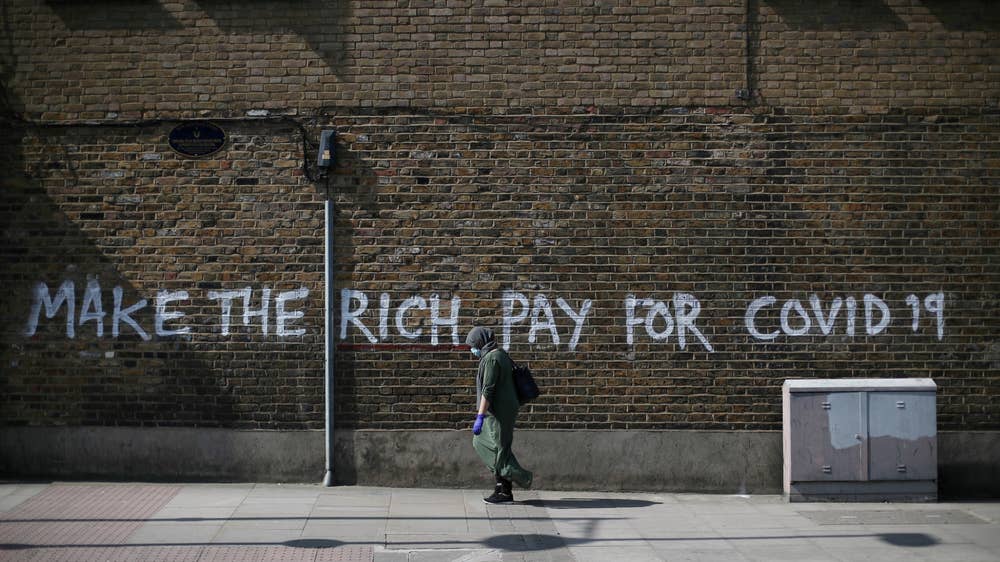
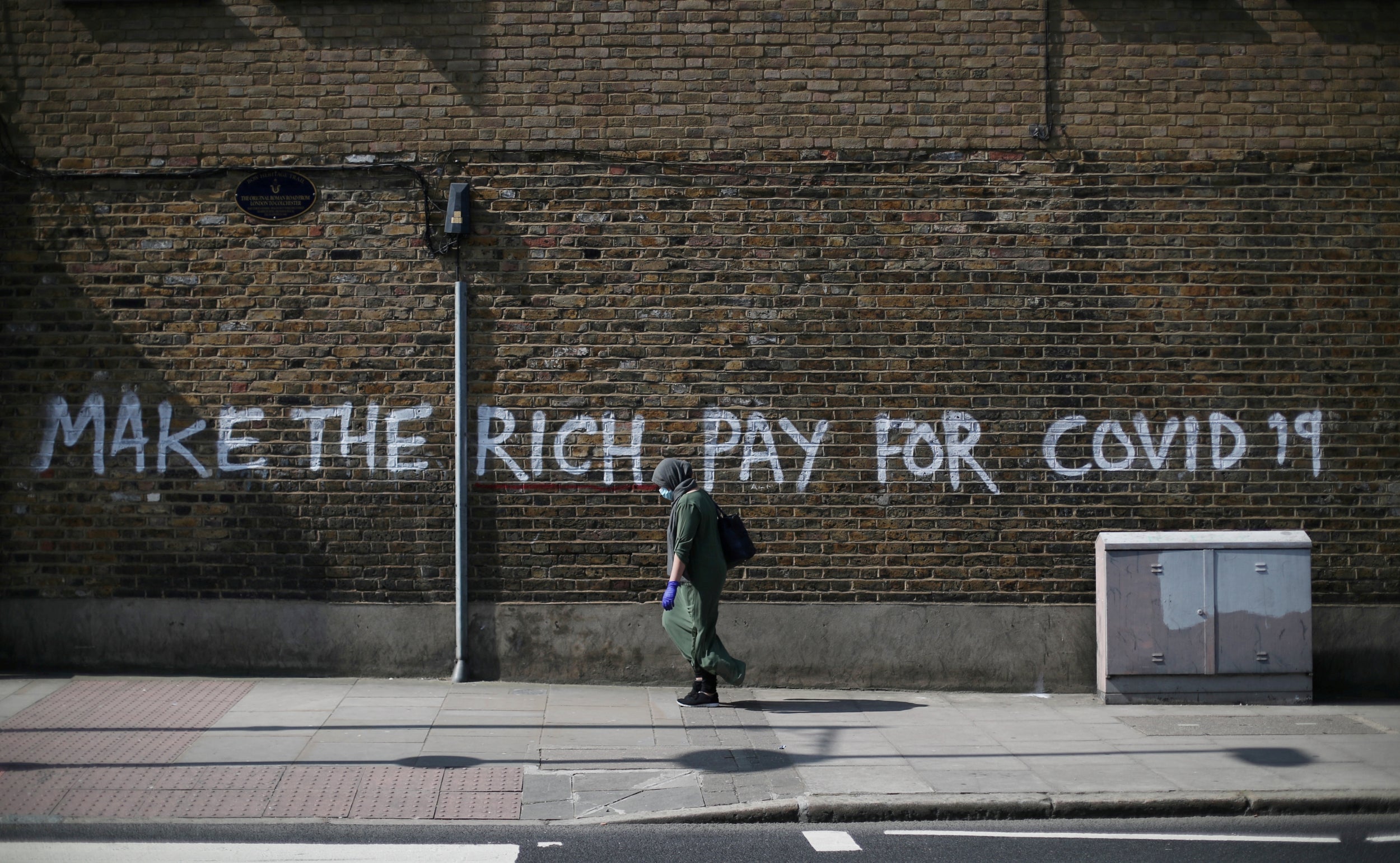
1/51 16 April 2020
A woman wearing a protective face mask and gloves walks past graffiti in Bow, as the spread of the coronavirus disease (COVID-19) continues, London, Britain, April 16, 2020
REUTERS
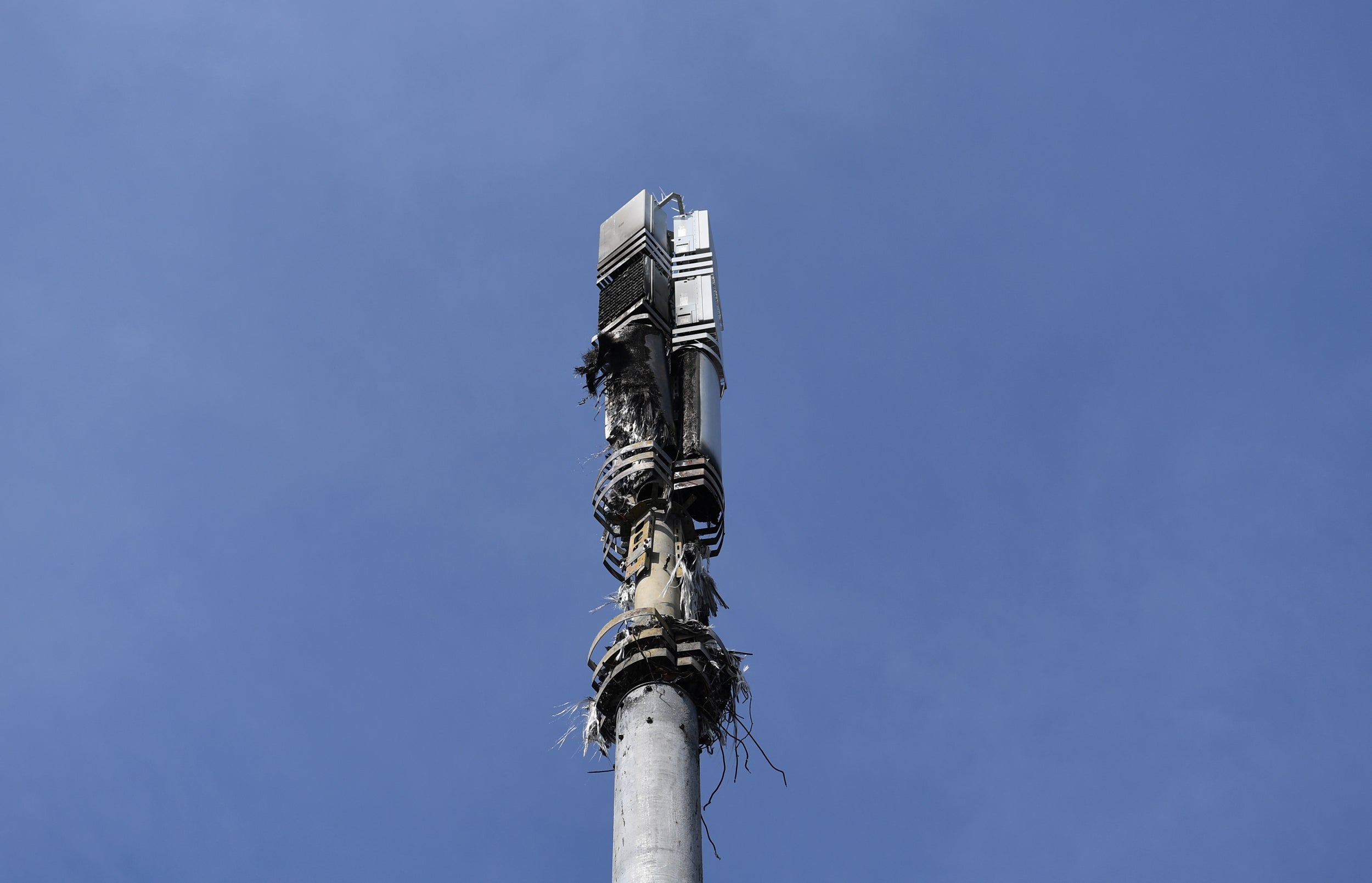
2/51 15 April 2020
A burned down mobile phone mast in London.According to reports, at least 20 mobile phone masts across Britain are believed to have been vandalised and government and telecom sources are increasingly concerned about the impact of conspiracy theories linking coronavirus to 5G networks
EPA
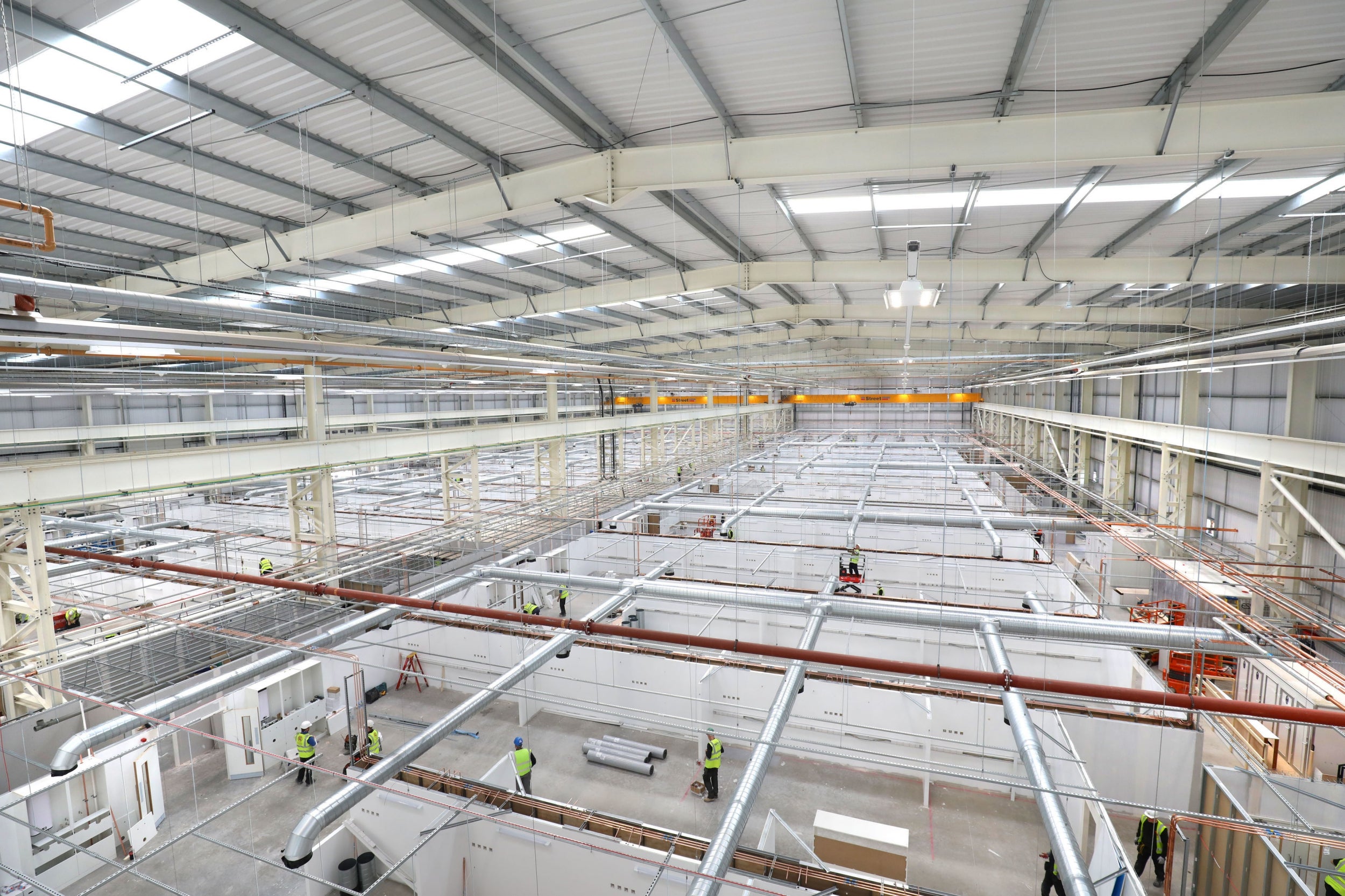
3/51 14 April 2020
The new Nightingale Hospital in Washington, Tyne and Wear, being fitted out
PA
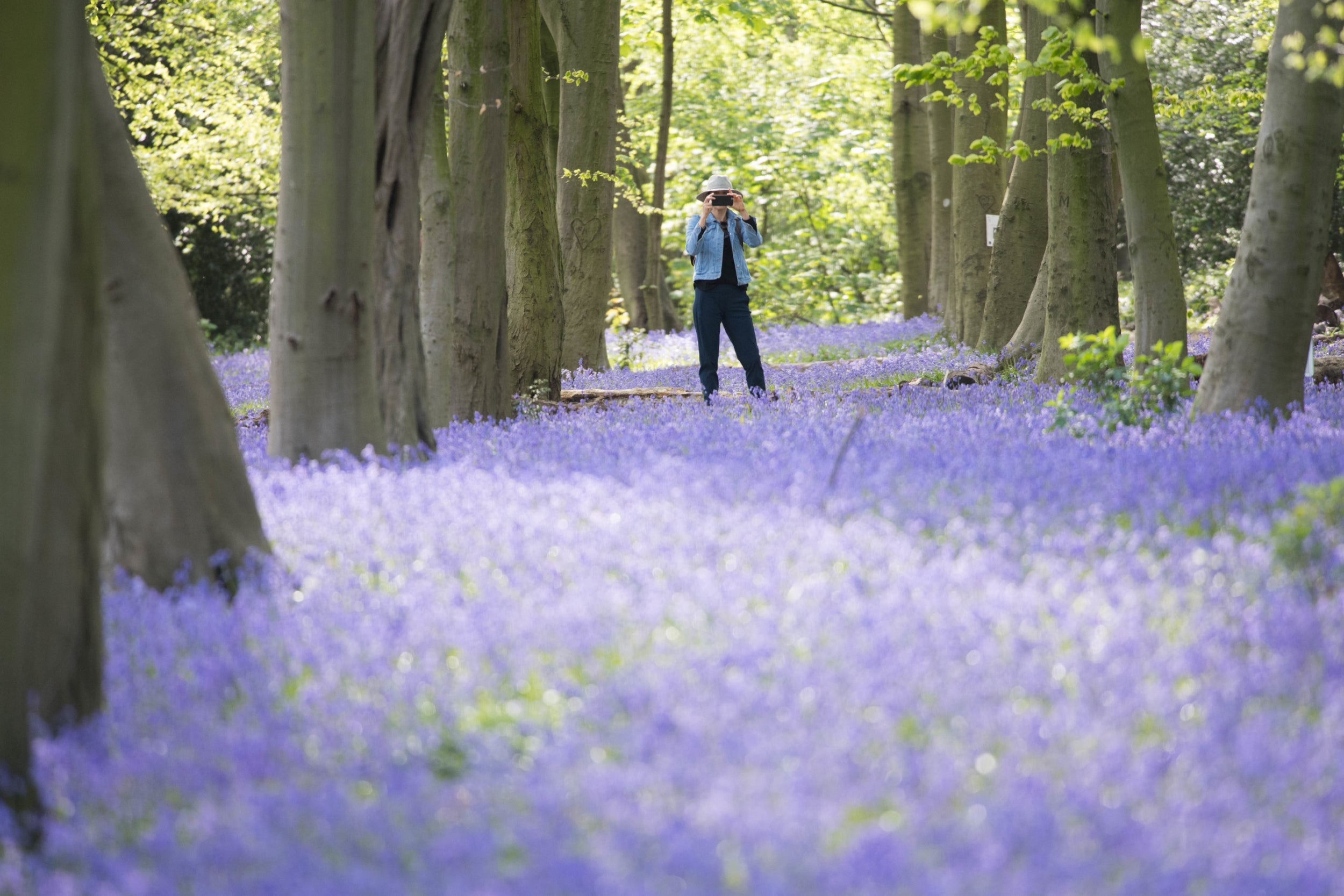
4/51 13 April 2020
Walkers enjoy the bluebells in Wanstead Park in London
PA
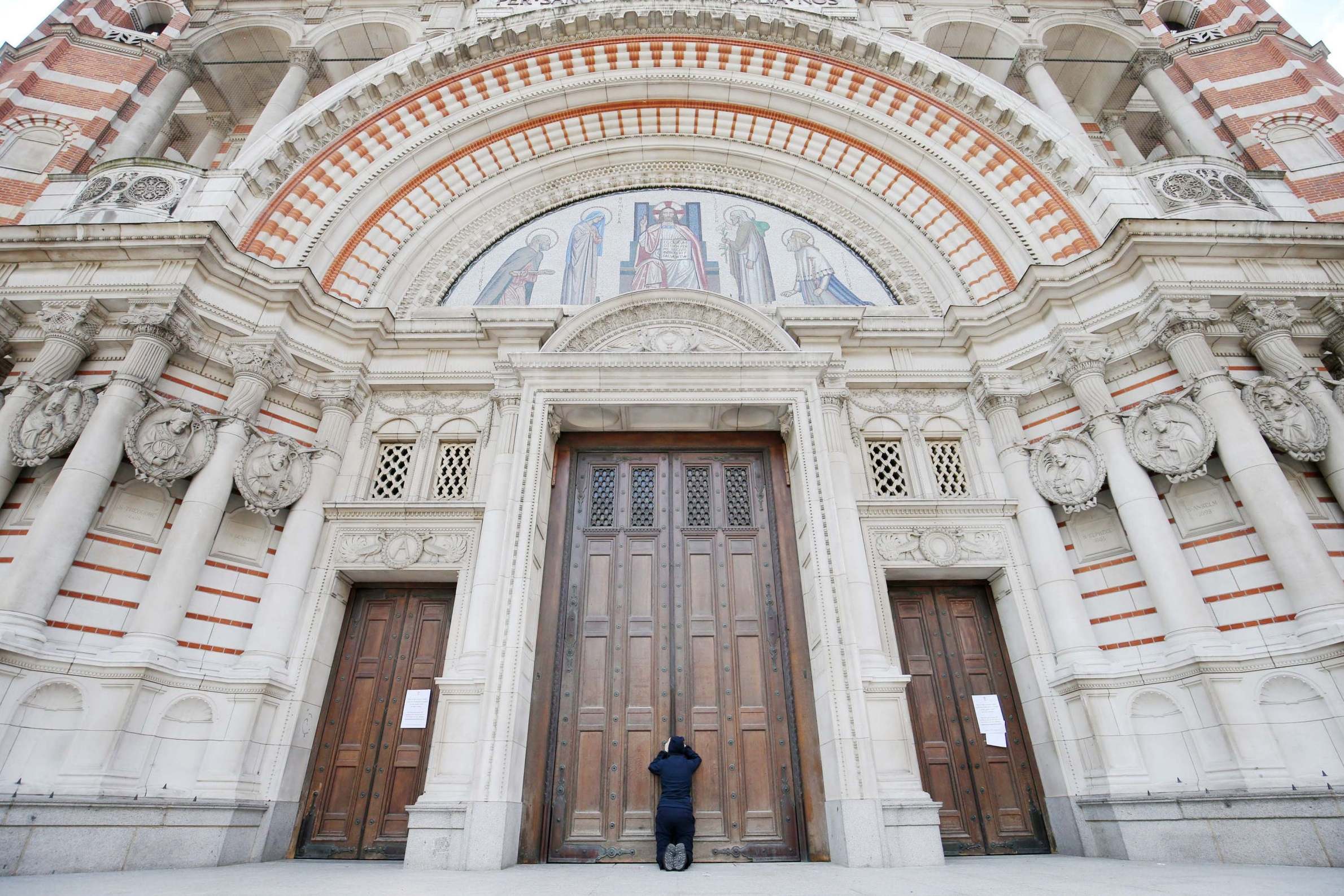
5/51 12 April 2020
A woman prays at the closed doors of Westminster Cathedral ahead of the Easter morning mass, London, as the UK continues in lockdown to help curb the spread of the coronavirus. Churches across the country have been continuing to broadcast services digitally in the lead-up to Easter, with more than 1,000 livestreams taking place on a regular basis
PA
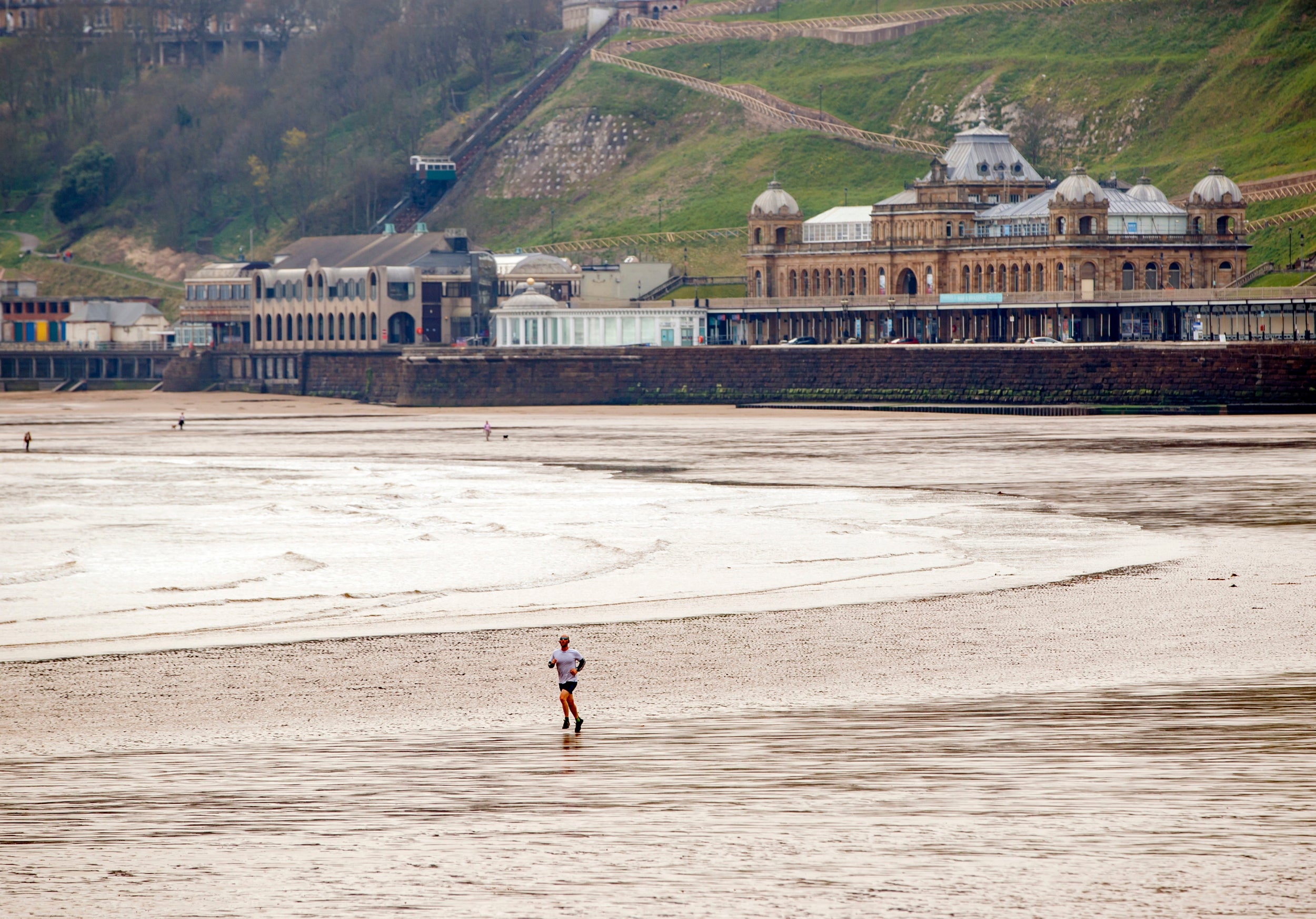
6/51 11 April 2020
A man jogs on an empty beach in Scarborough as the UK continues in lockdown to help curb the spread of the coronavirus
PA
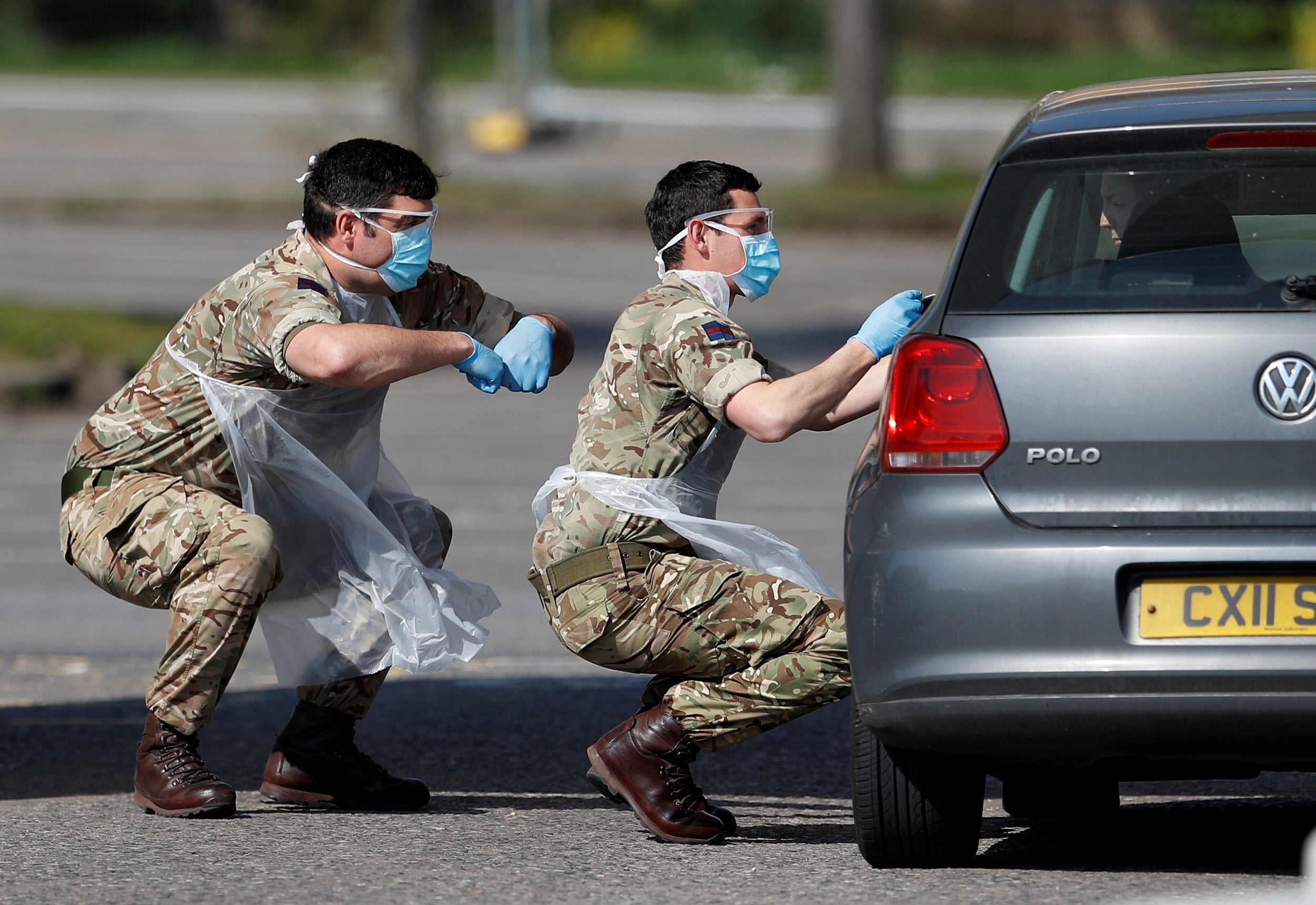
7/51 10 April 2020
Military personnel testing people at a coronavirus test centre in the car park of Chessington World of Adventures
Reuters
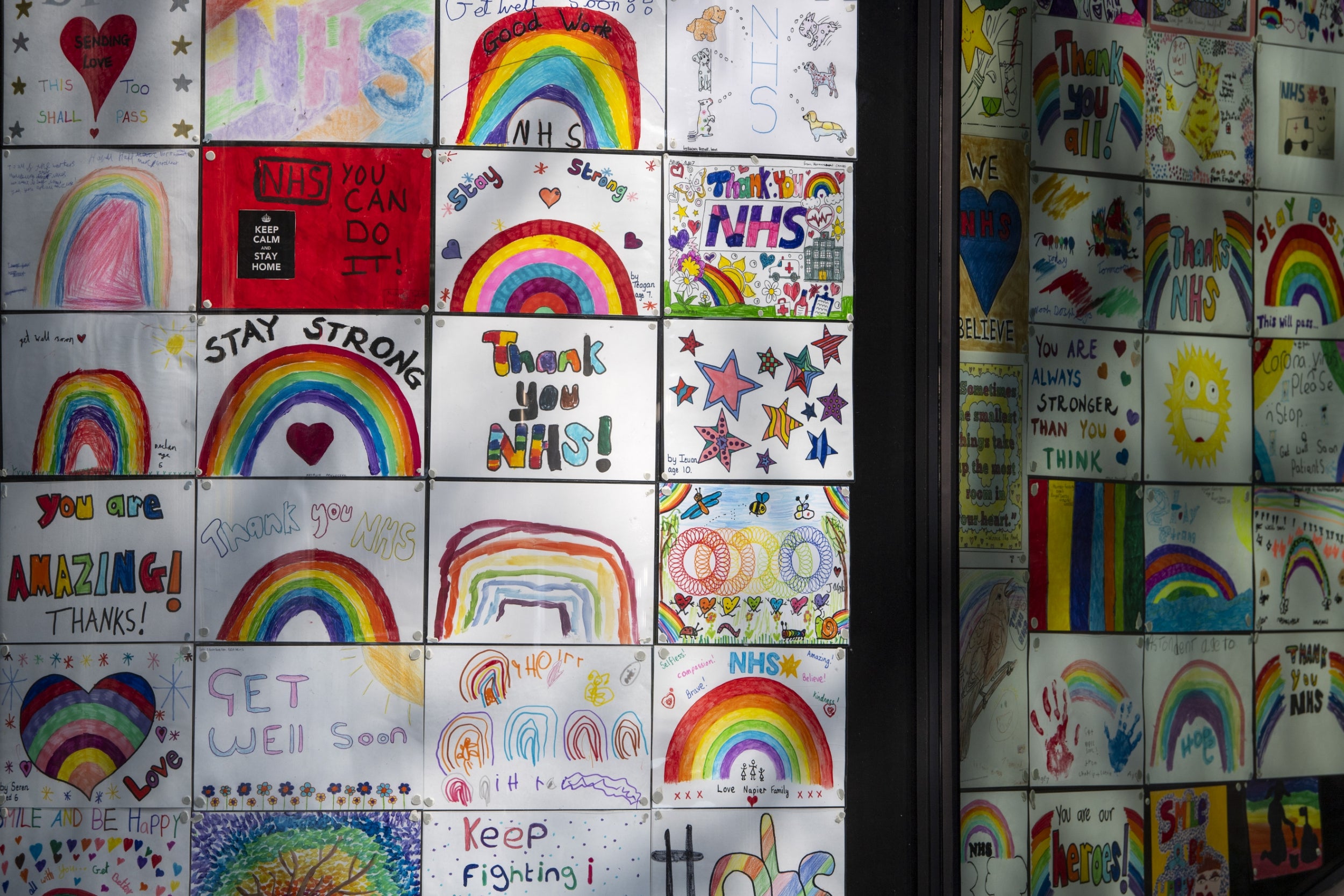
8/51 9 April 2020
Posters drawn by children displayed in support of the NHS in a building near St Thomas’ Hospital in London
Getty
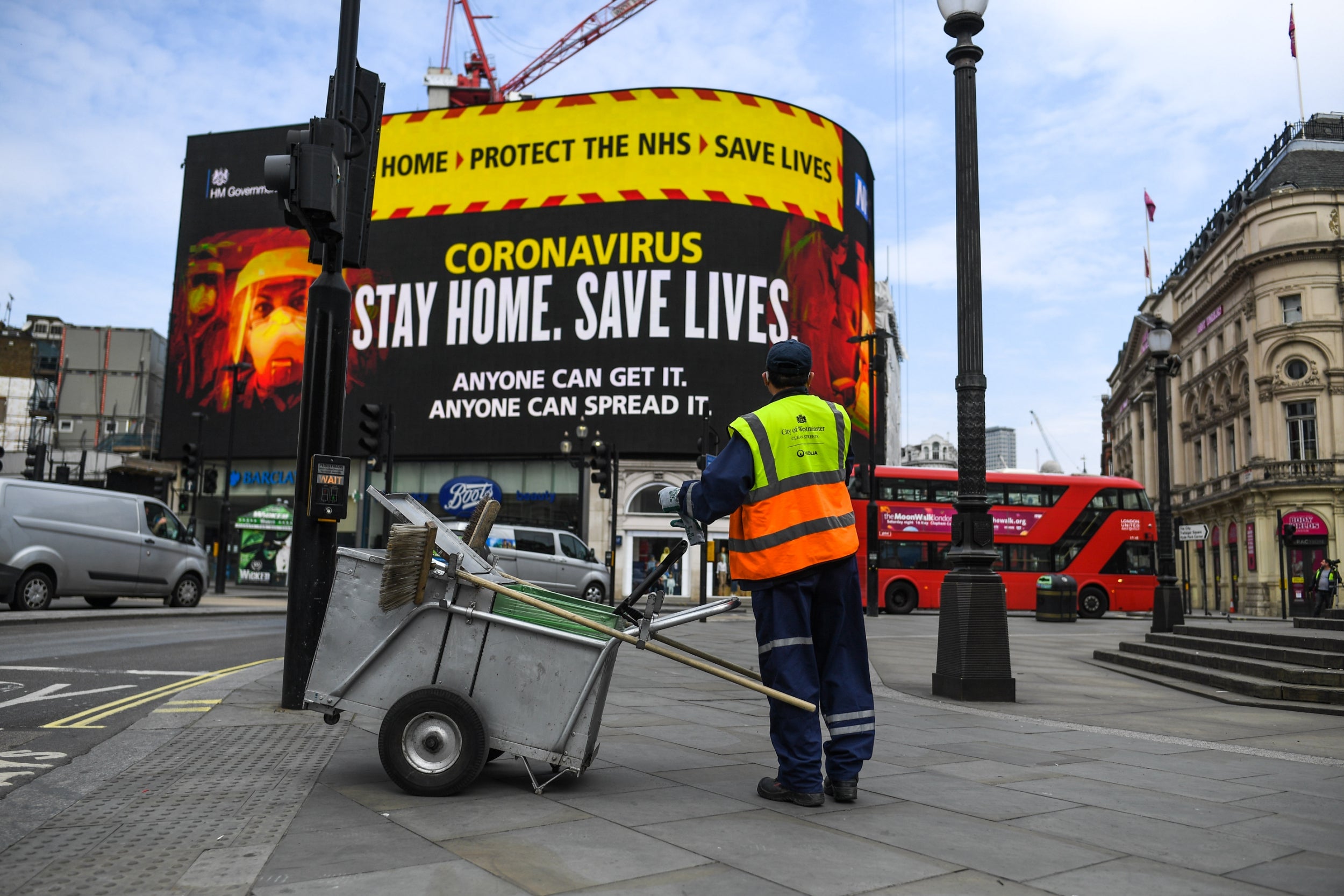
9/51 8 April 2020
A street cleaner in front of Coronavirus messaging on Picadilly Circus in London
Getty
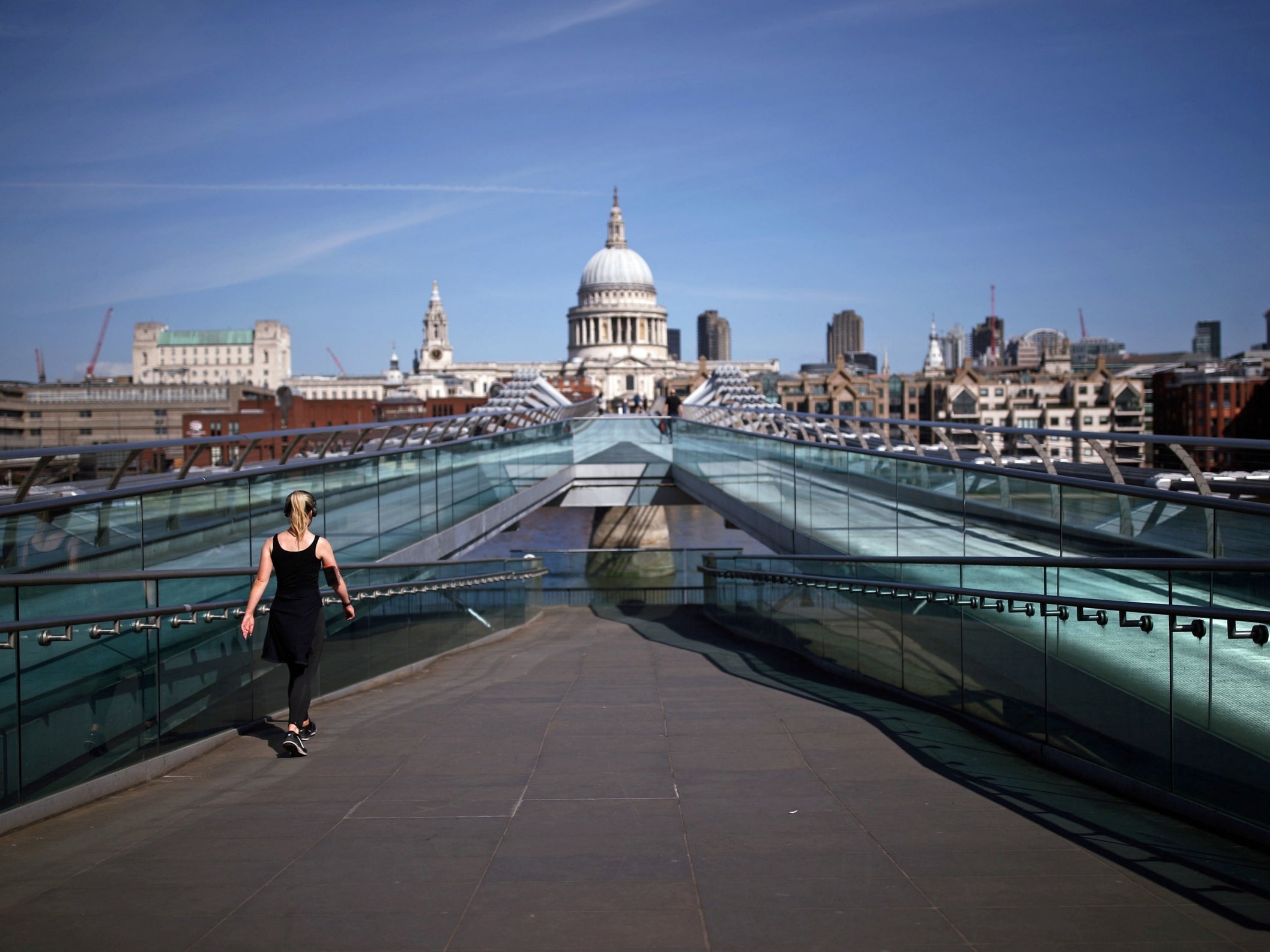
10/51 7 April 2020
A jogger on the Millennium Bridge in London, as the UK continues in lockdown to help curb the spread of the coronavirus
PA
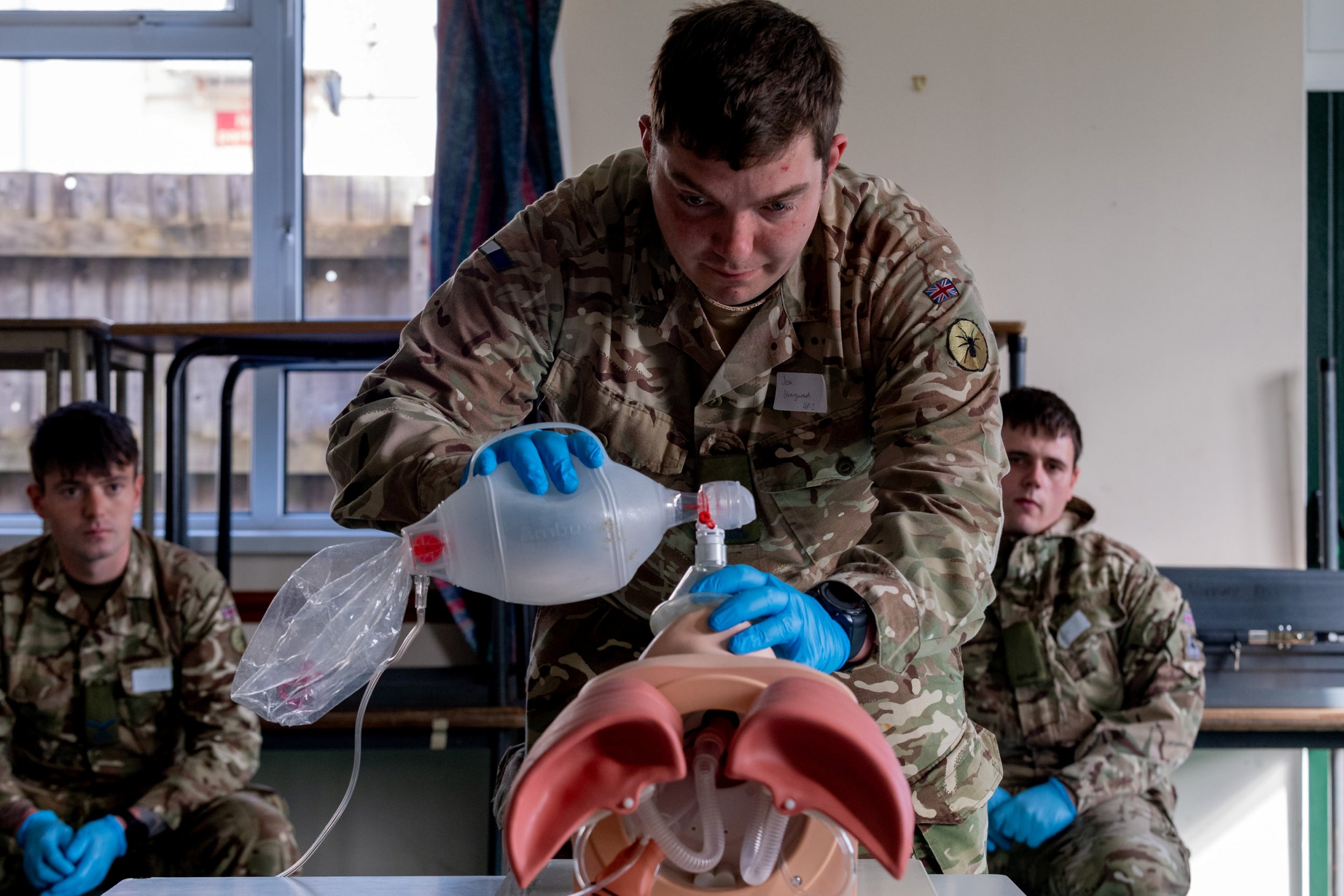
11/51 6 April 2020
A Royal Signals soldier practices during training held by the British Army. They are preparing them to support the Welsh Ambulance Service NHS Trust in the battle against coronavirus
Ministry of Defence/Reuters
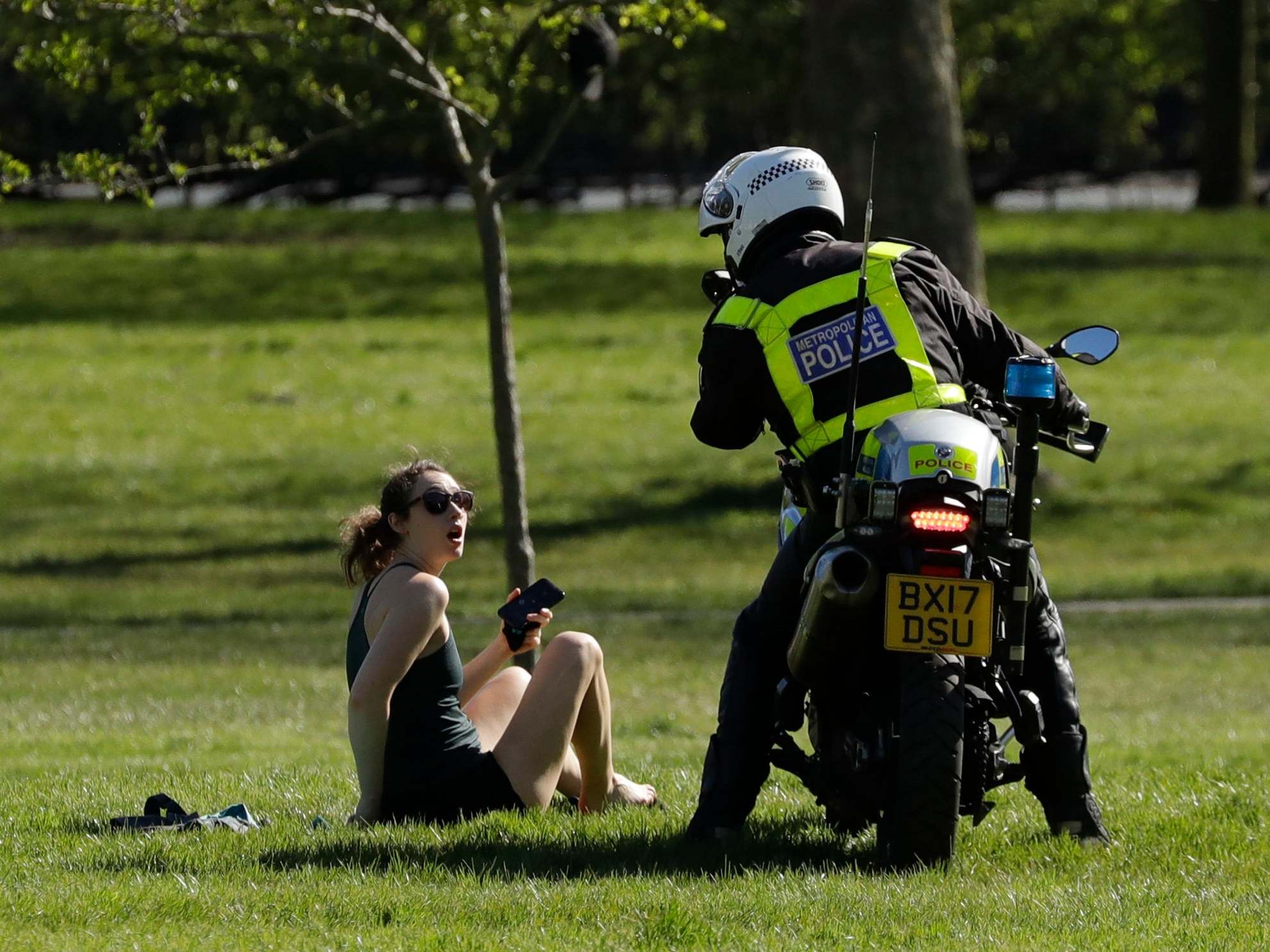
12/51 5 April 2020
A police officer advises a woman to go home after spotting her enjoying the sun in Primrose Hill, London
AP
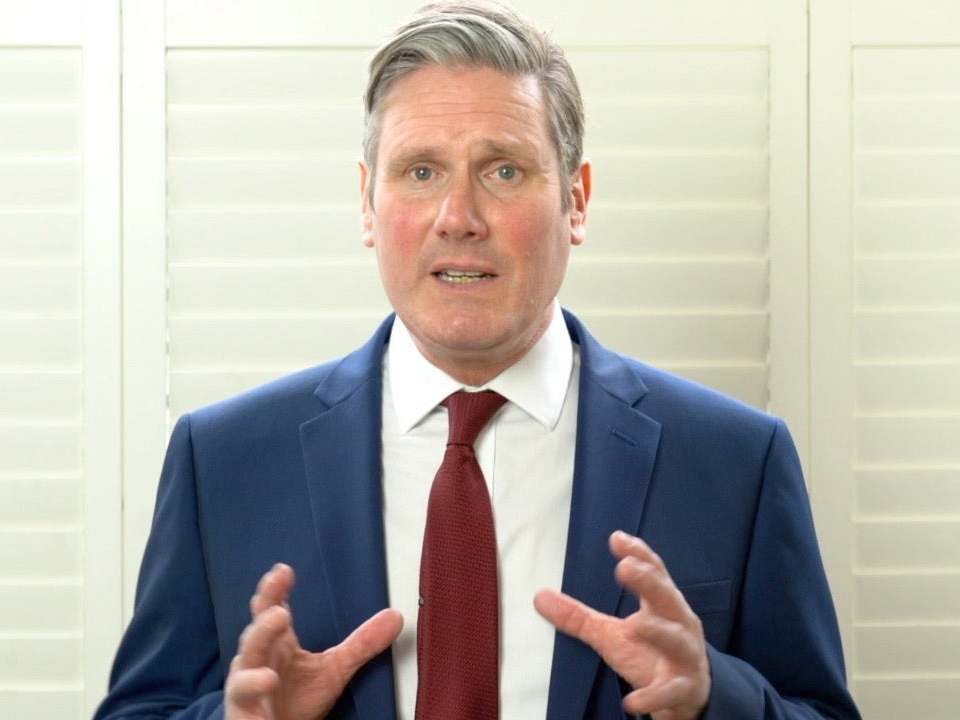
13/51 4 March 2020
New Leader of the Labour Party Keir Starmer speaks on the announcement of his victory in the leadership race of the Labour Party
AFP via Getty

14/51 3 April 2020
Health Secretary Matt Hancock and NHS staff stand on marks on the ground, put in place to ensure social distancing guidelines are adhered to, at the opening of the NHS Nightingale Hospital at the ExCel centre in London, a temporary hospital with 4000 beds which has been set up for the treatment of Covid-19 patients. PA Photo. Picture date: Friday April 3, 2020. Split into more than 80 wards containing 42 beds each, the facility will be used to treat Covid-19 patients who have been transferred from other intensive care units across London.
PA
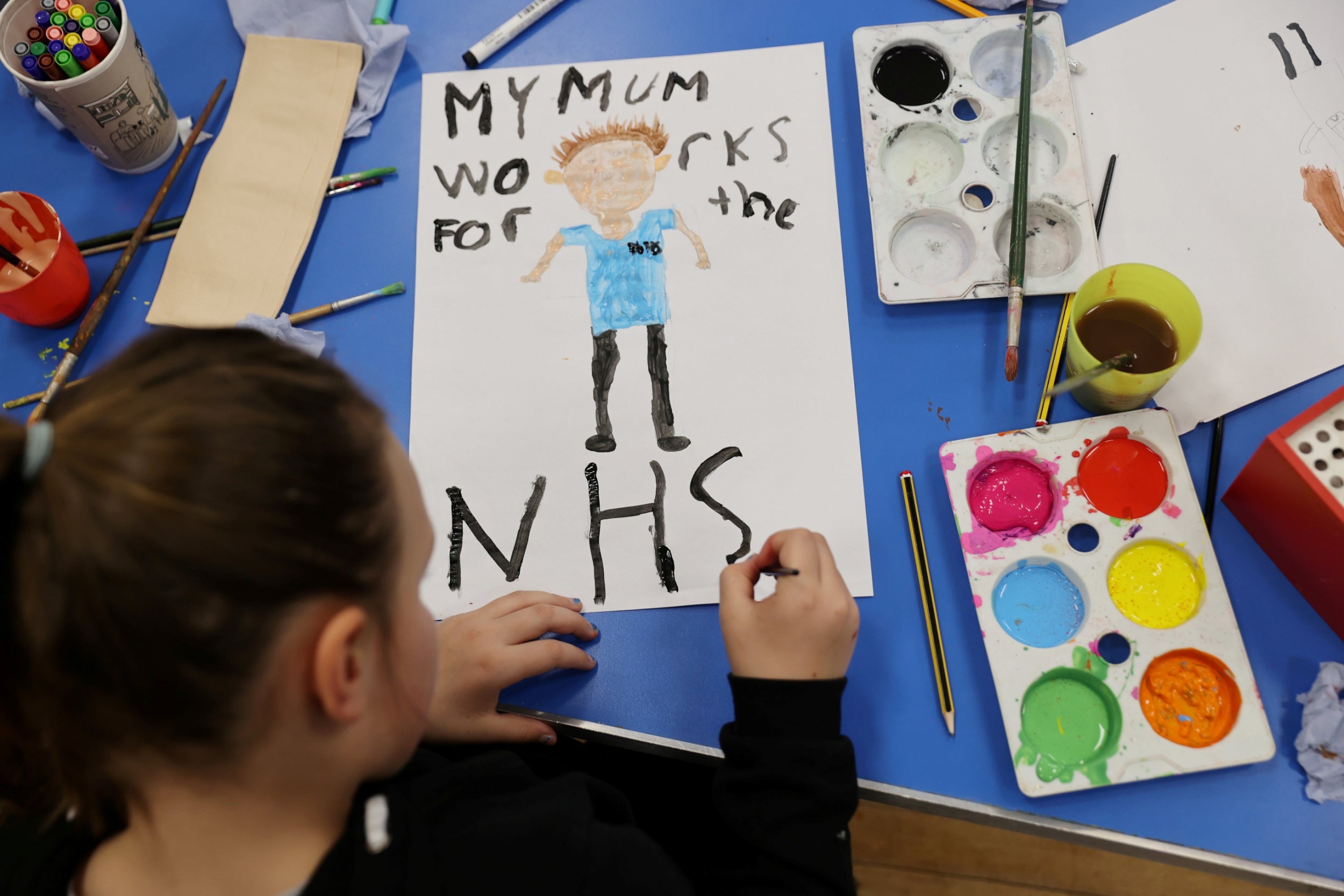
15/51 2 April 2020
A child at Westlands Primary School paints a poster in support of the NHS in Newcastle-under-Lyme
Reuters
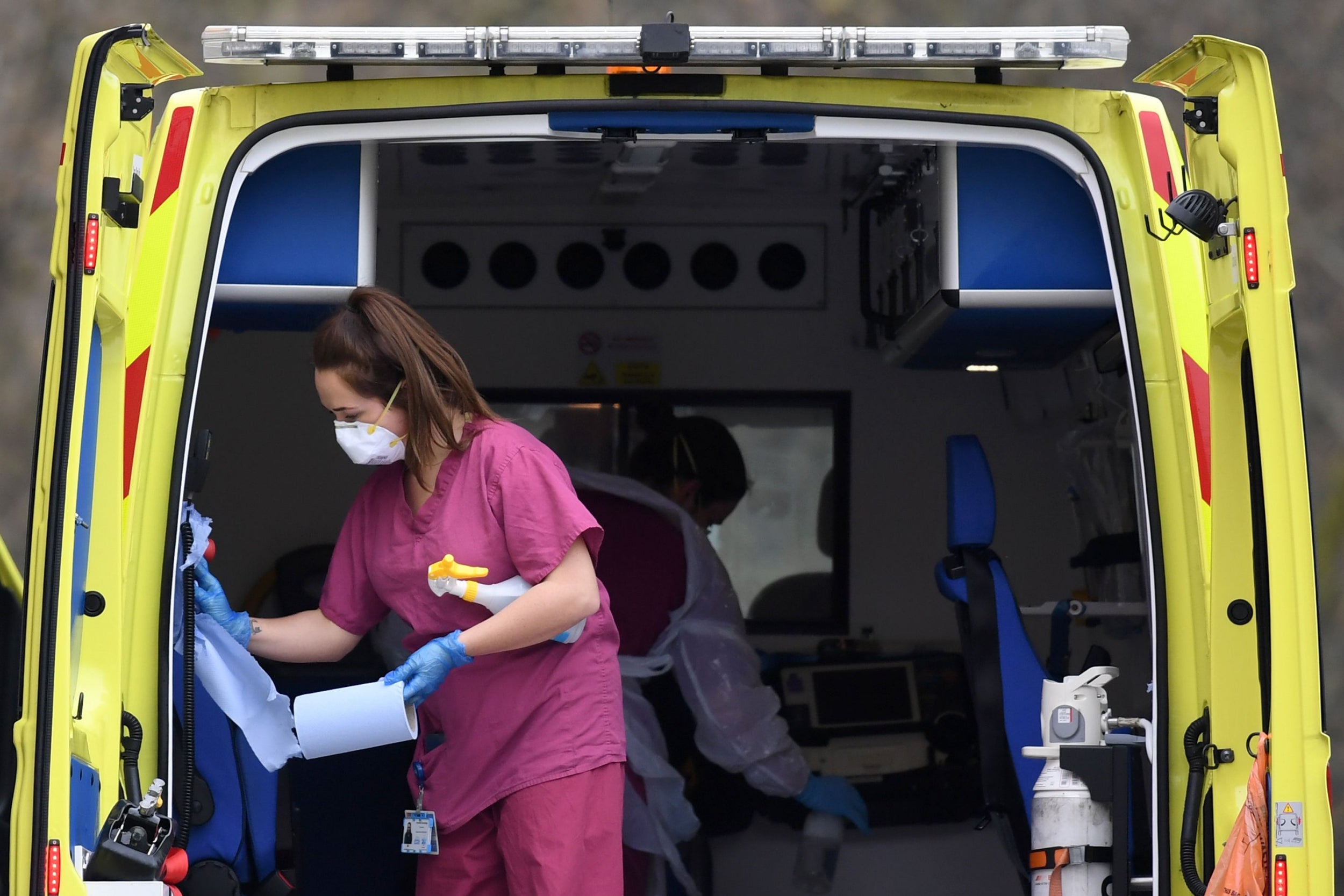
16/51 1 April 2020
Staff wearing PPE of gloves and face masks, as a preactionary measure against Covid-19, disinfect an ambulance after it arrived with a patient at St Thomas’ Hospital in north London
AFP via Getty
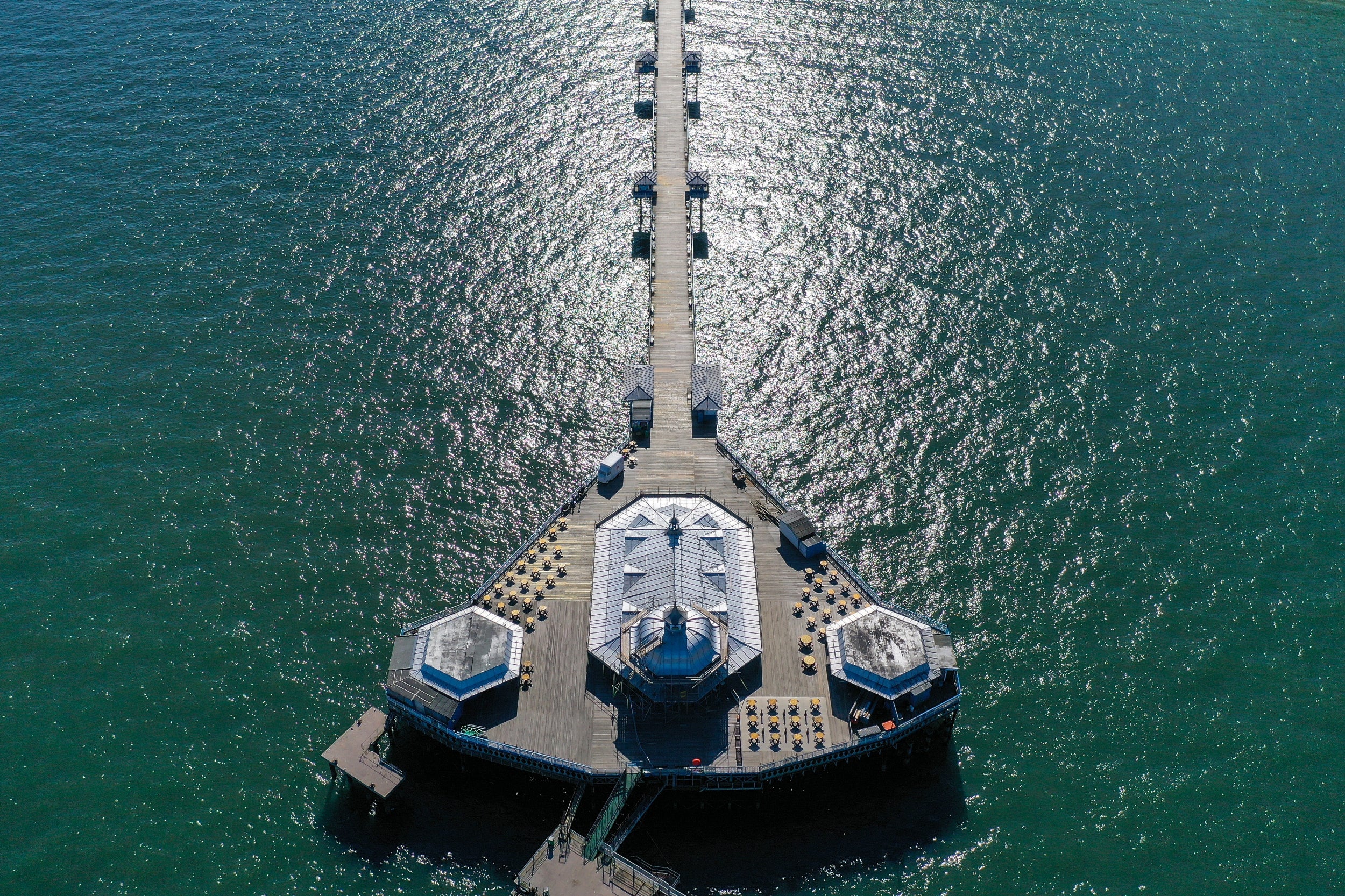
17/51 31 March 2020
Llandudno Pier remains closed and deserted of tourists during the pandemic lockdown in Wales
Getty

18/51 30 March 2020
Waves break against the pier at Tynemouth, on the North East coast
PA
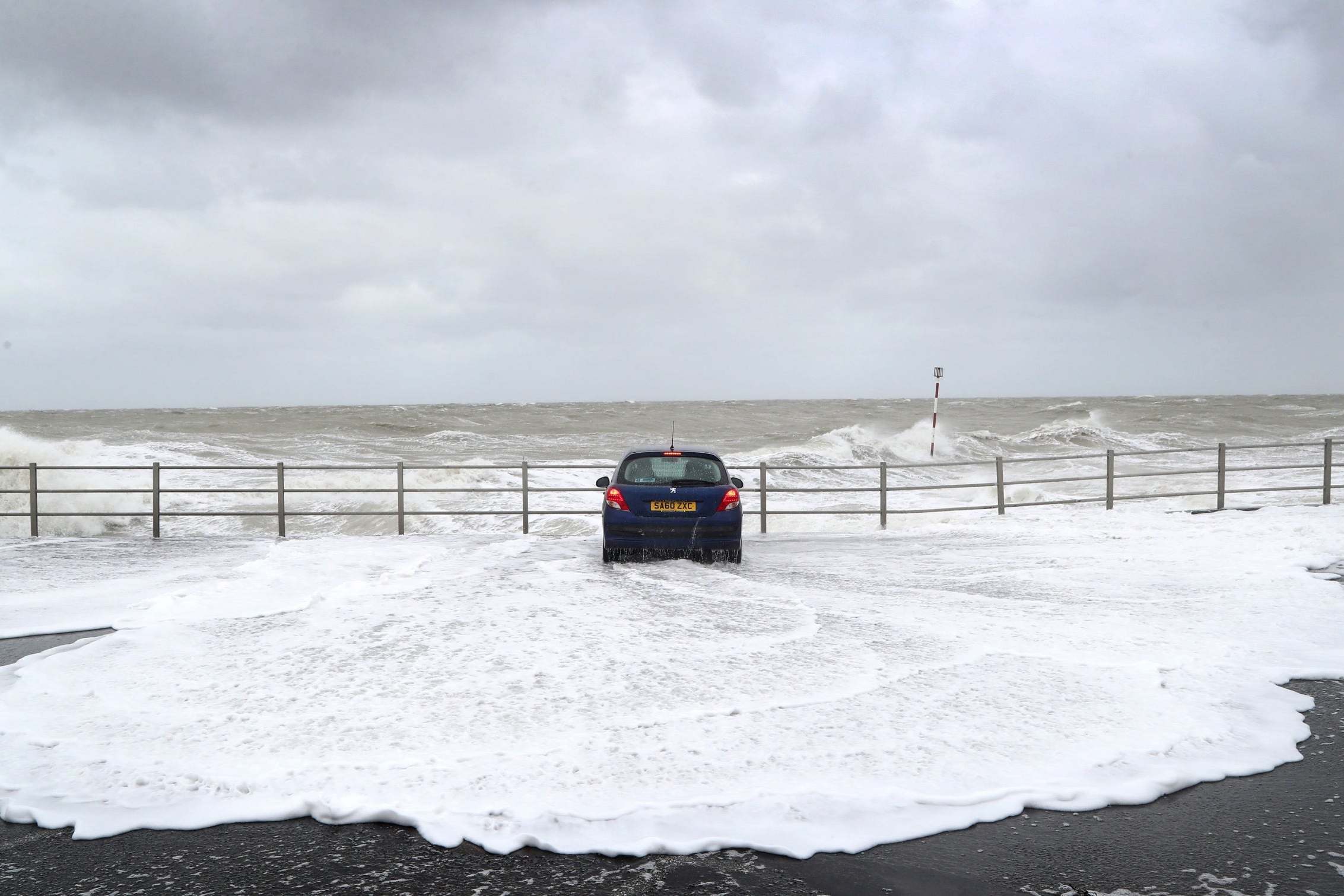
19/51 29 March 2020
Waves crash over a car on the seafront during windy conditions in Broadstairs, Kent
PA

20/51 28 March 2020
Derbyshire Police dye the “blue lagoon” in Harpur Hill, Buxton black, as gatherings there are “dangerous” and are “in contravention of the current instruction of the UK Government”
PA
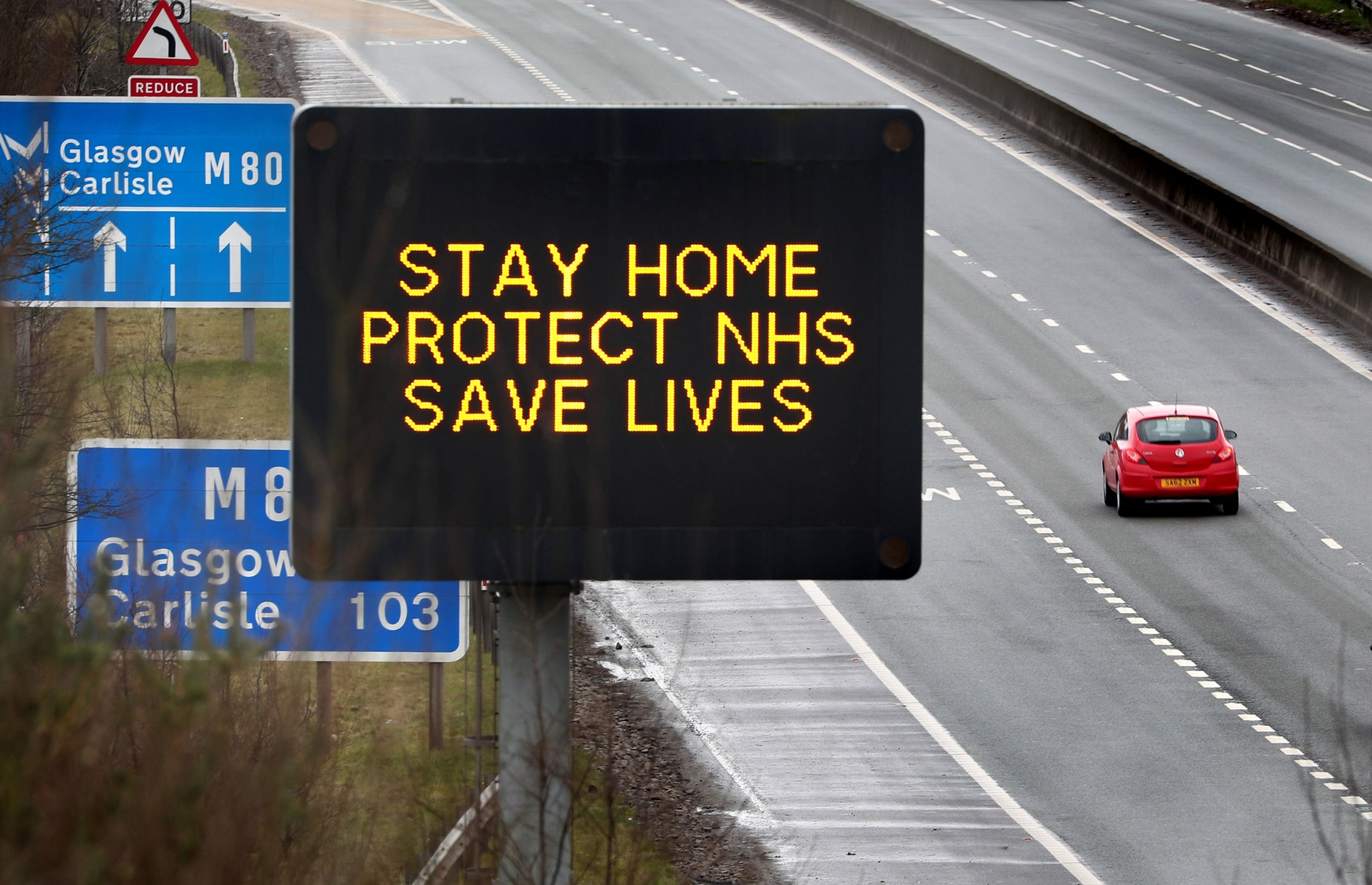
21/51 27 March 2020
A road sign advising drivers to ‘stay home protect NHS saves lives’ is visible on the M80 near Banknock as the UK continues in lockdown to help curb the spread of the coronavirus
PA
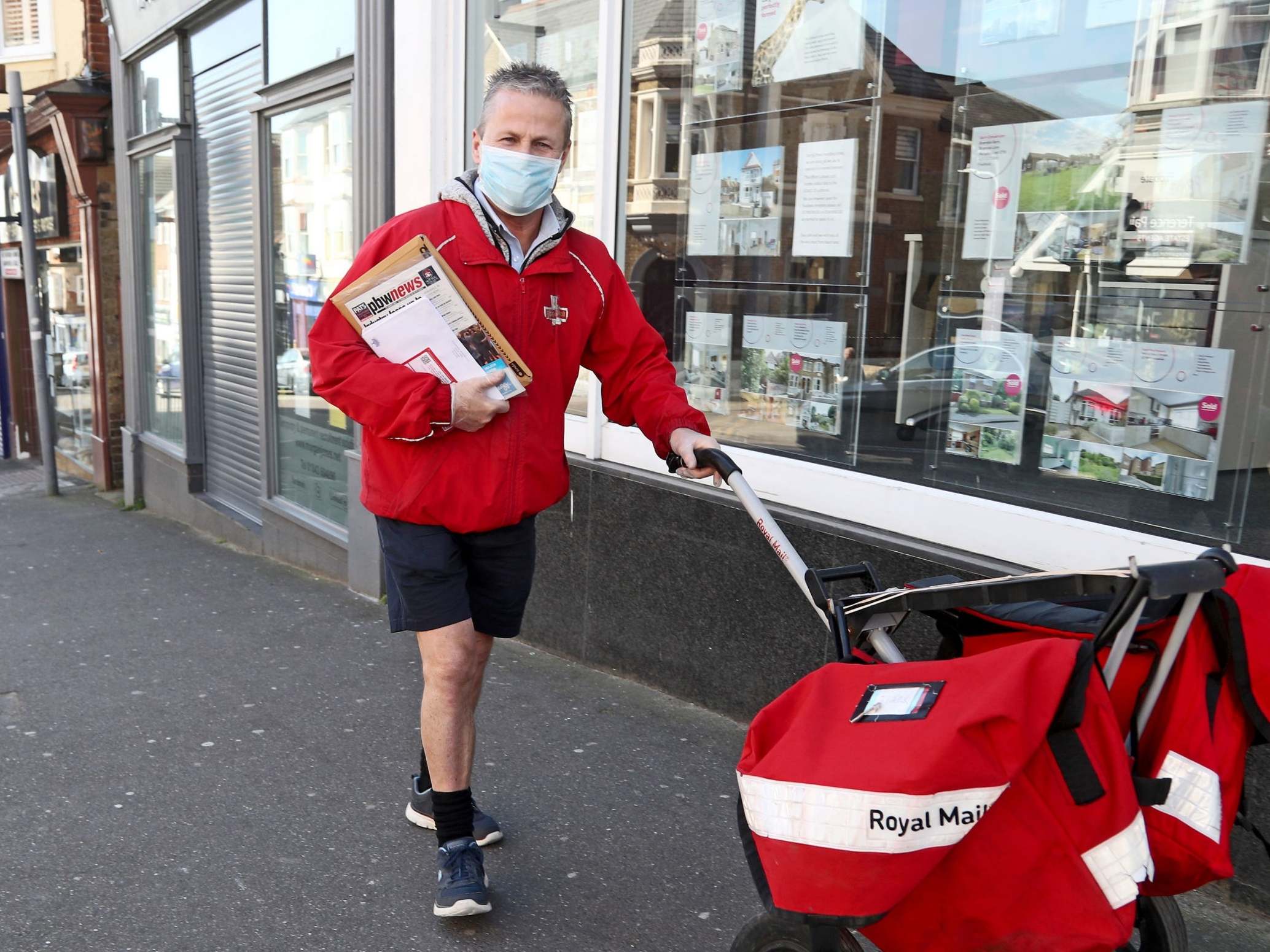
22/51 26 March 2020
A postman wears a mask and gloves to deliver letters in Broadstairs, Kent, after Prime Minister Boris Johnson has put the UK in lockdown to help curb the spread of the coronavirus. PA Photo. Picture date: Thursday March 26, 2020. The UK’s coronavirus death toll reached 463 on Wednesday.
PA

23/51 25 March 2020
Members of the public out exercising on Brighton beach at sunset
Getty
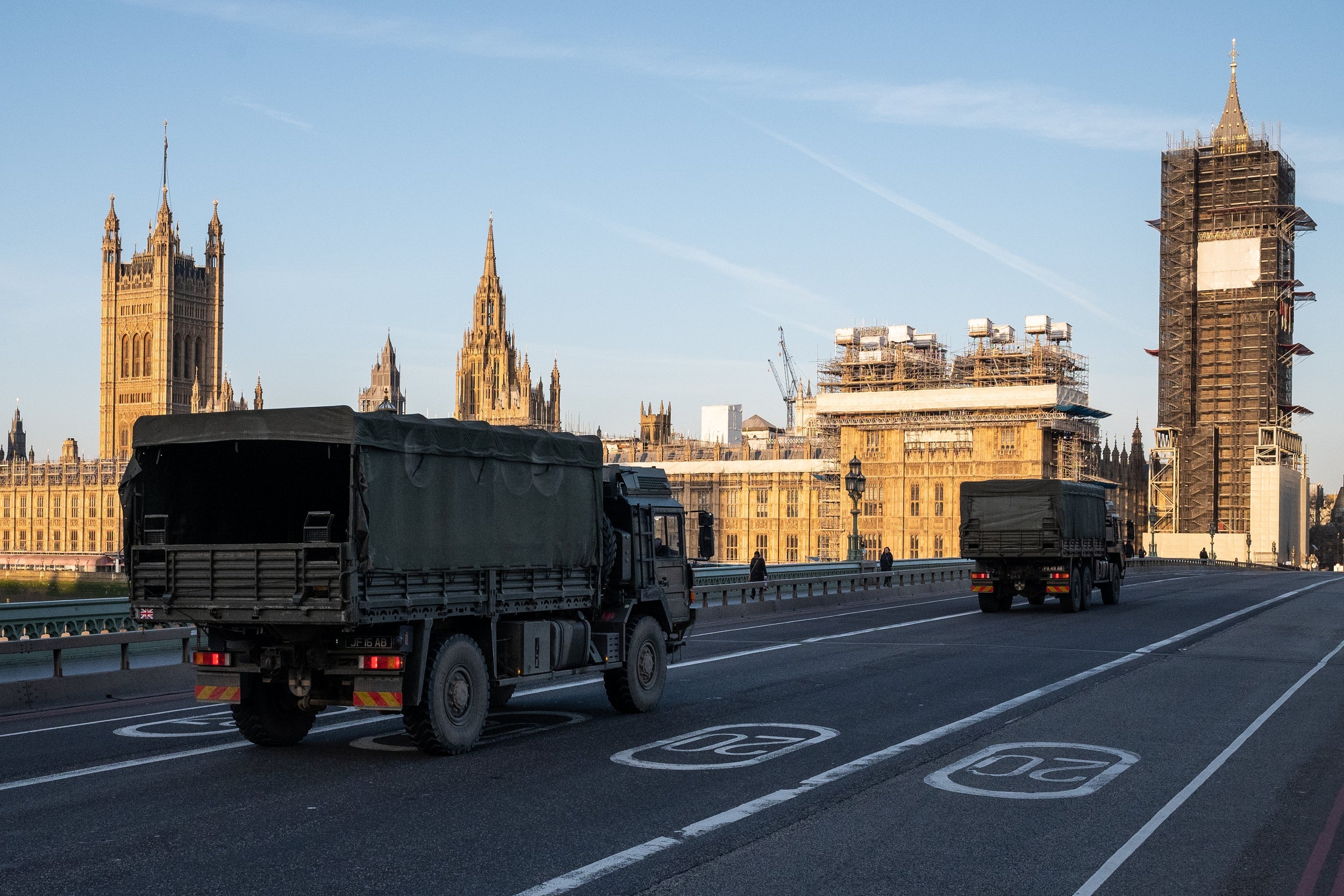
24/51 24 March 2020
Military vehicles cross Westminster Bridge after members of the 101 Logistic Brigade delivered a consignment of medical masks to St Thomas’ hospital
Getty
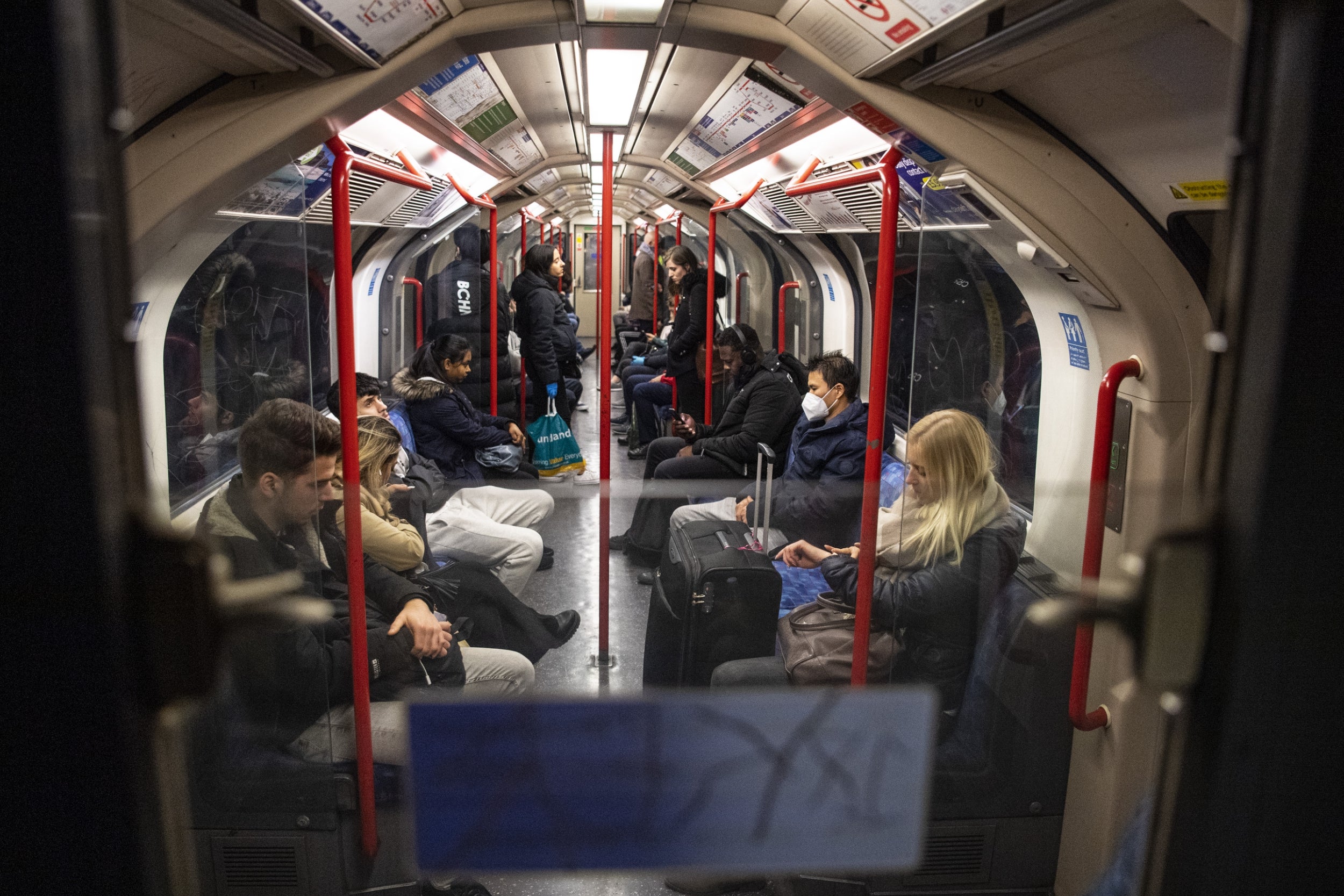
25/51 23 March 2020
Commuters travel on the London underground during the Coronavirus pandemic
Getty
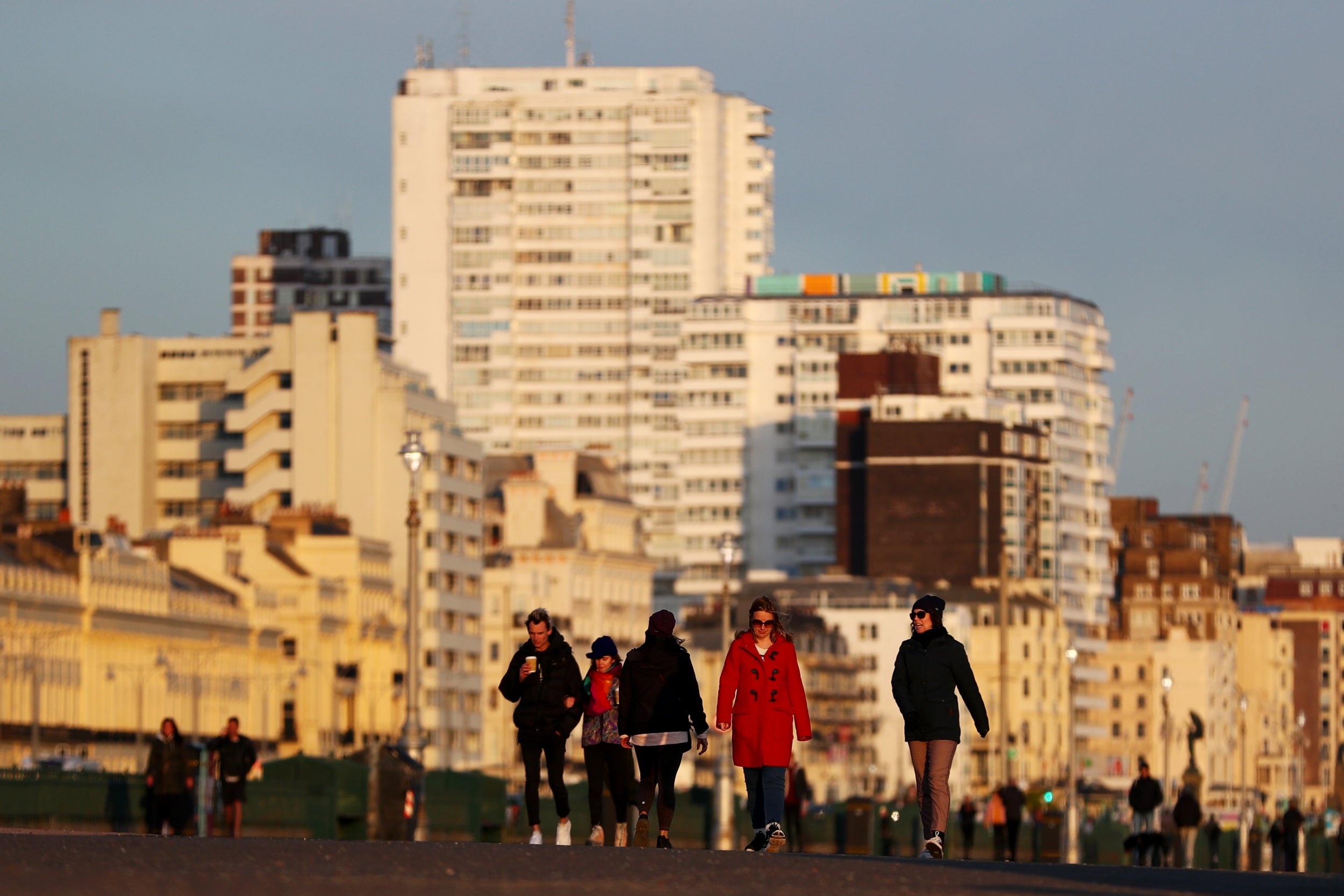
26/51 22 March 2020
People walk on the seafront after recent incidents of members of the public ignoring government advice on social distancing on in Hove
Getty
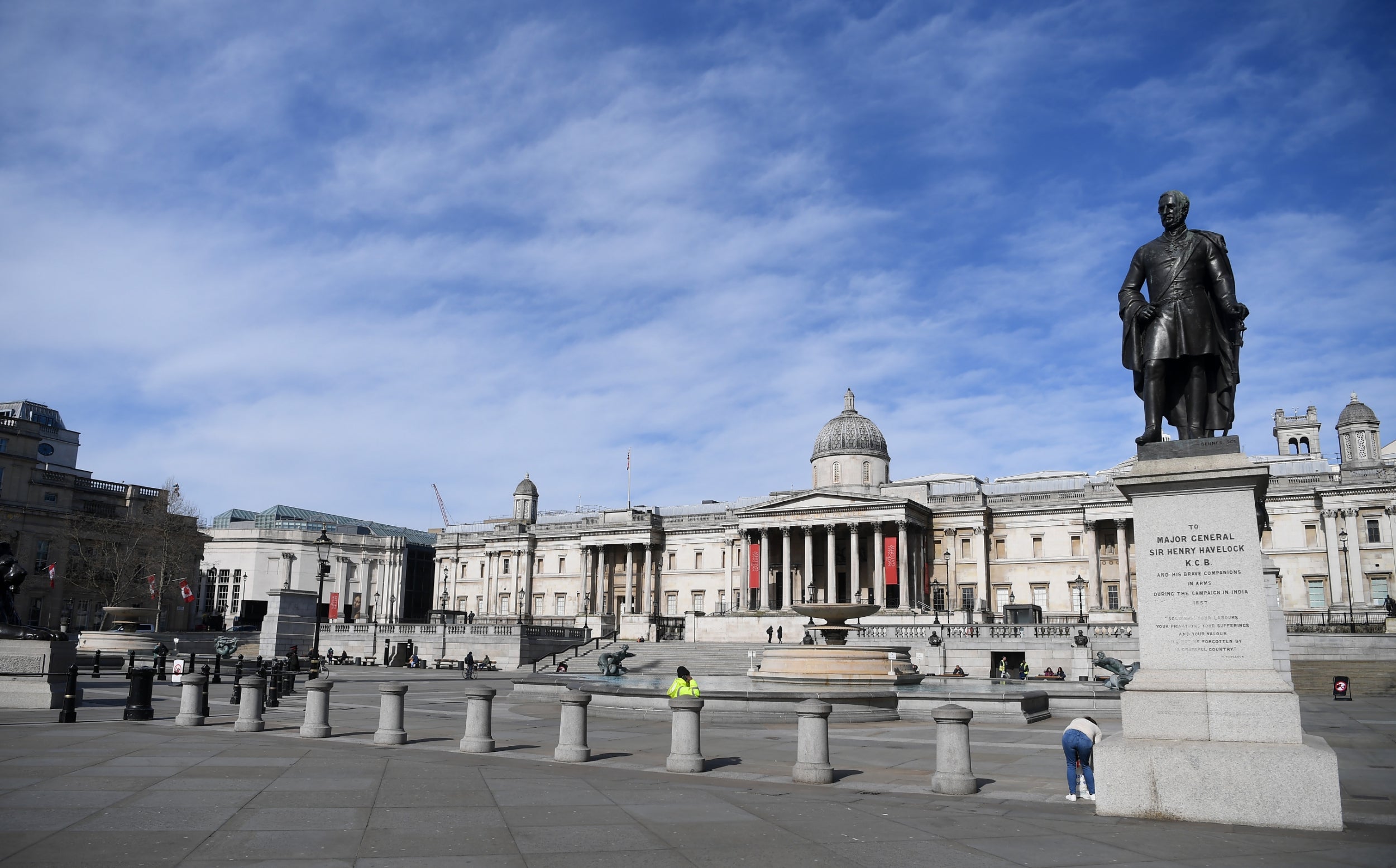
27/51 21 March 2020
A general view of an empty Trafalgar Square in London. There have as of now been 3,983 diagnosed coronavirus cases in the UK and 177 deaths
Getty
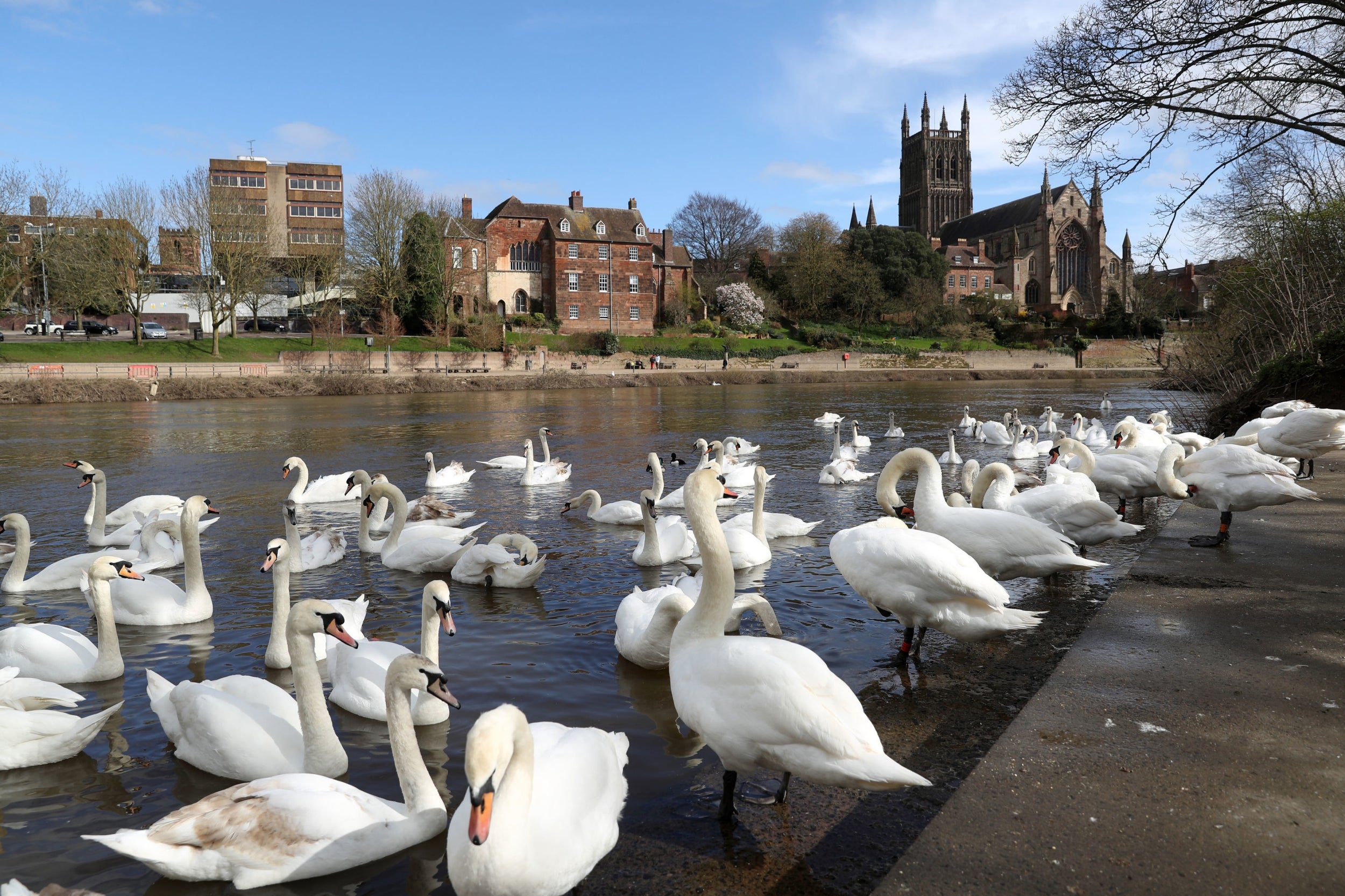
28/51 20 March 2020
Swans swim on the banks of the River Severn in Worcester
PA

29/51 19 March 2020
A piece of art by the artist, known as the Rebel Bear has appeared on a wall on Bank Street in Glasgow. The new addition to Glasgow’s street art is capturing the global Coronavirus crisis. The piece features a woman and a man pulling back to give each other a kiss
PA
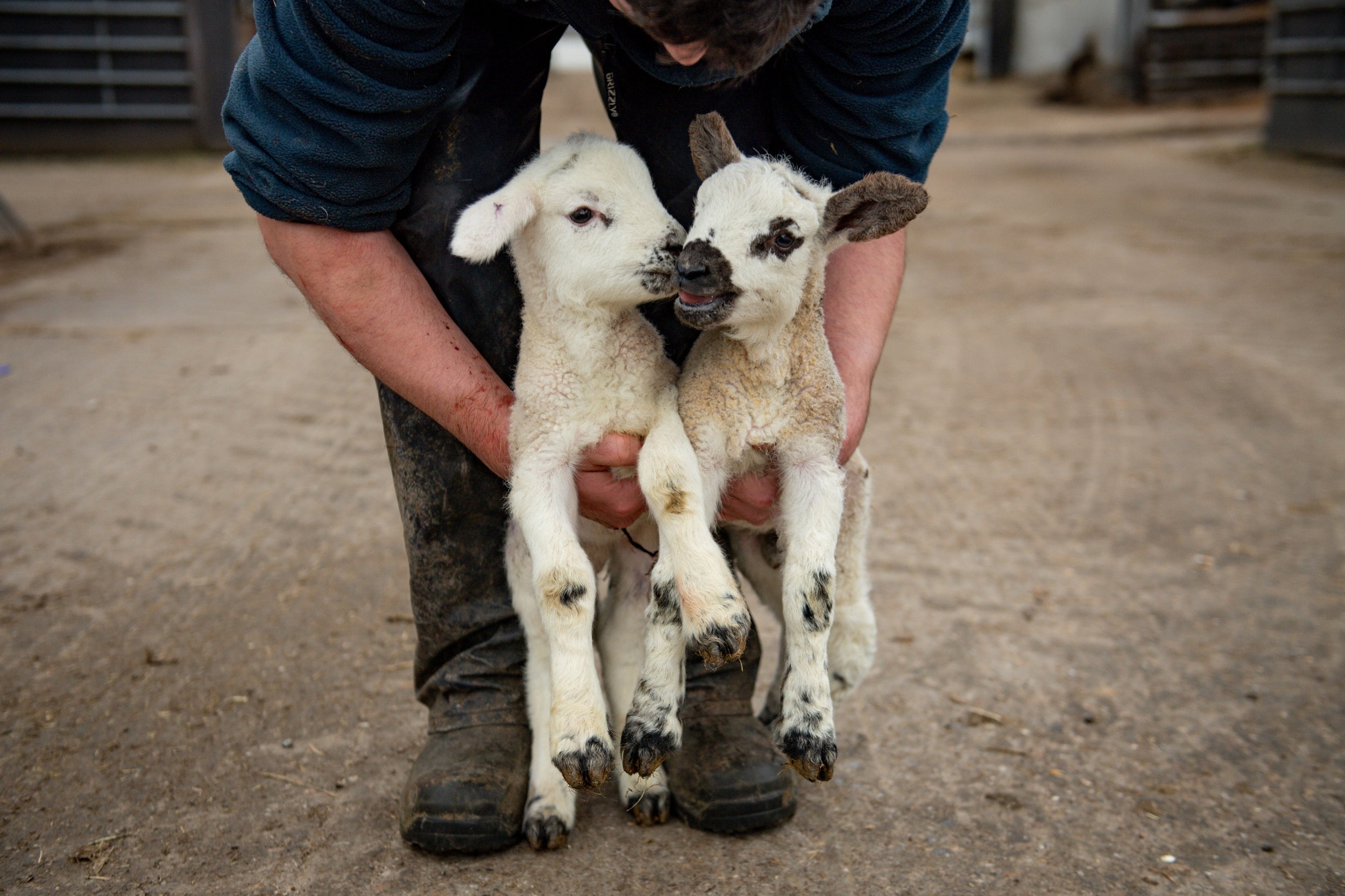
30/51 18 March 2020
Students tend to Spring Lambs at Moreton Morrell College in Warwickshire
PA

31/51 17 March 2020
Caerphilly Castle in South Wales joins Tourism Ireland’s Global Greenings campaign to mark St Patrick’s Day
PA
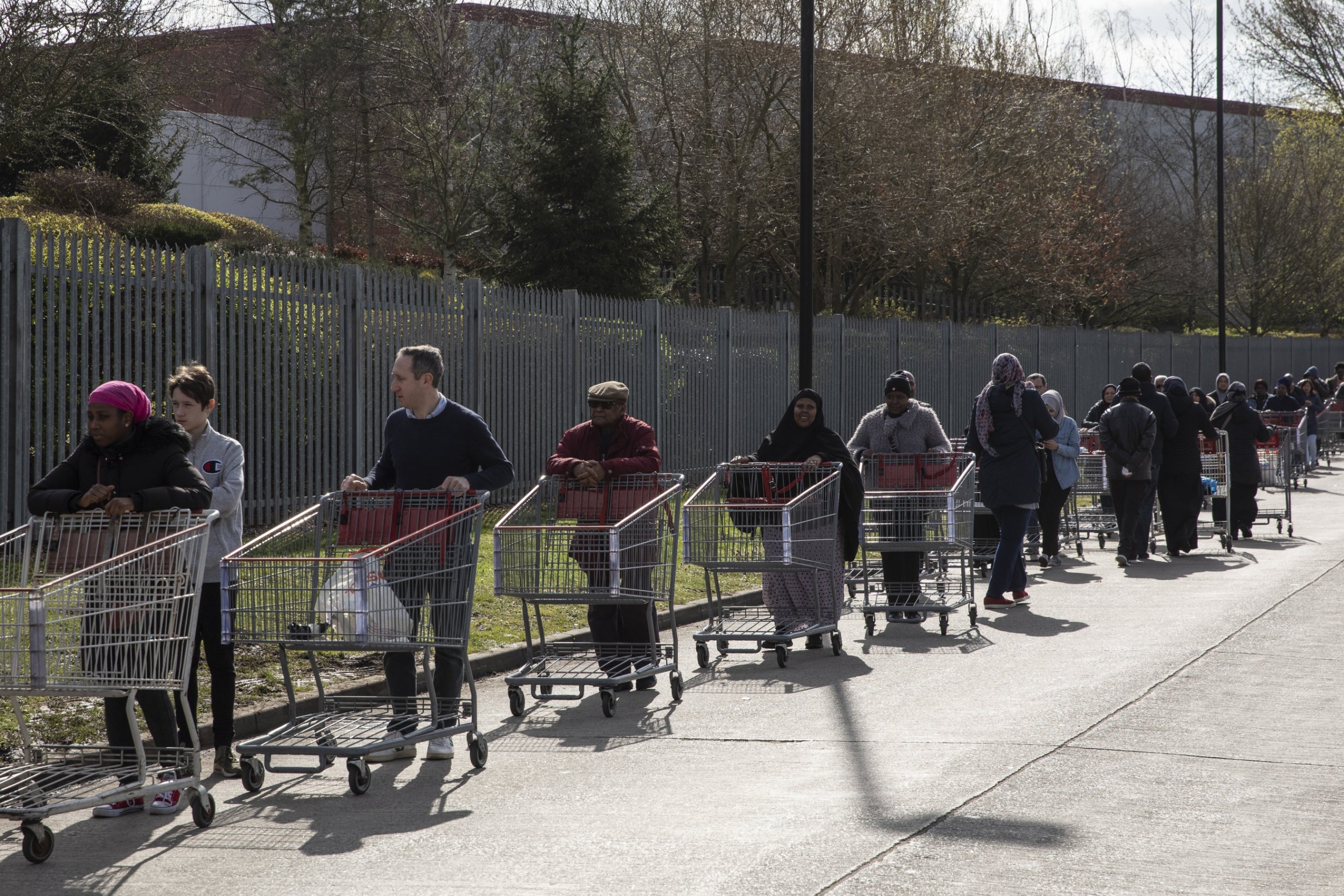
32/51 16 March 2020
Shoppers form long queues ahead of the opening of a Costco wholesale store in Chingford
Getty
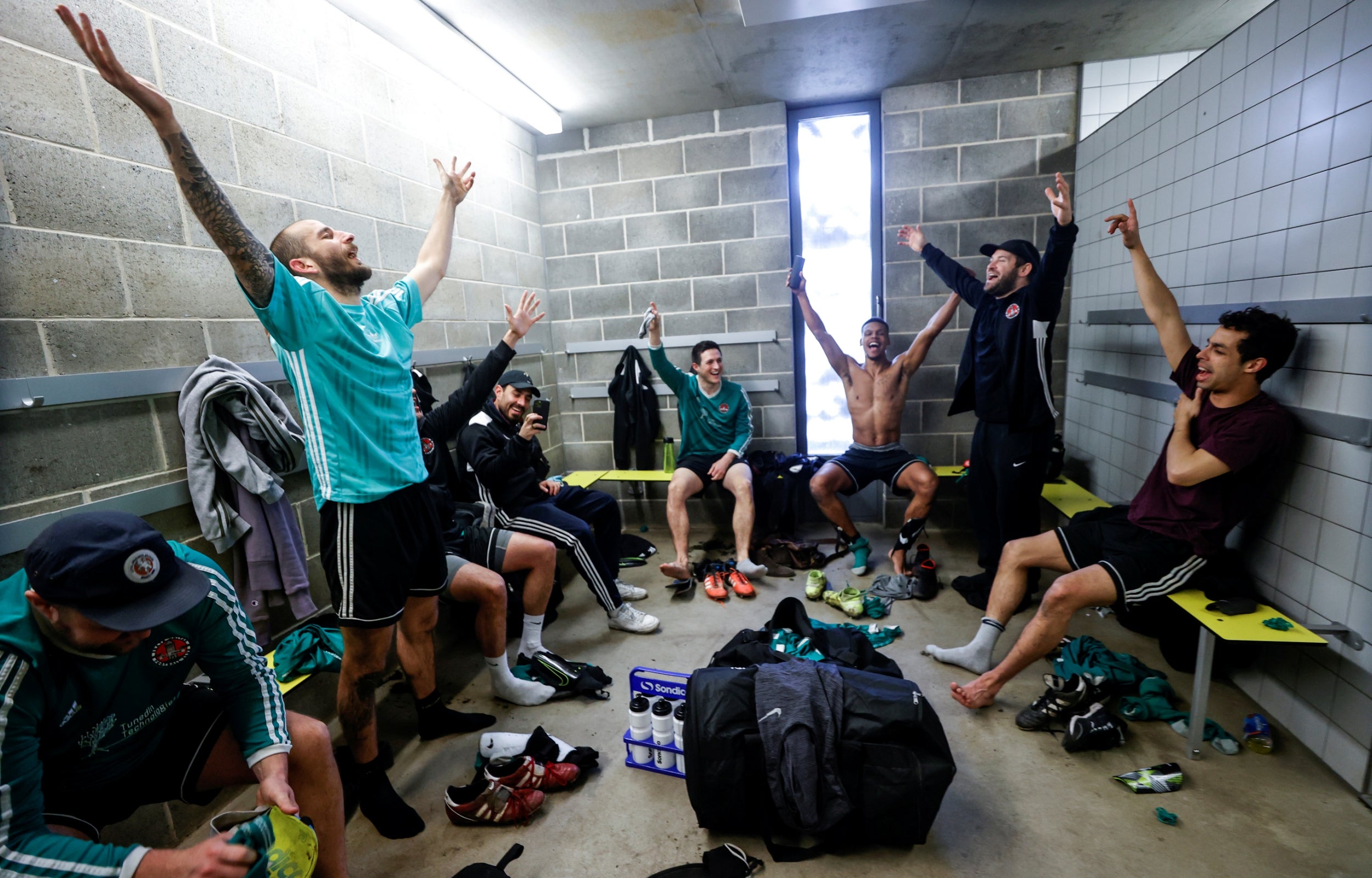
33/51 15 March 2020
Players sing songs in the changing room after their game of football at Hackney Marshes in London
Reuters
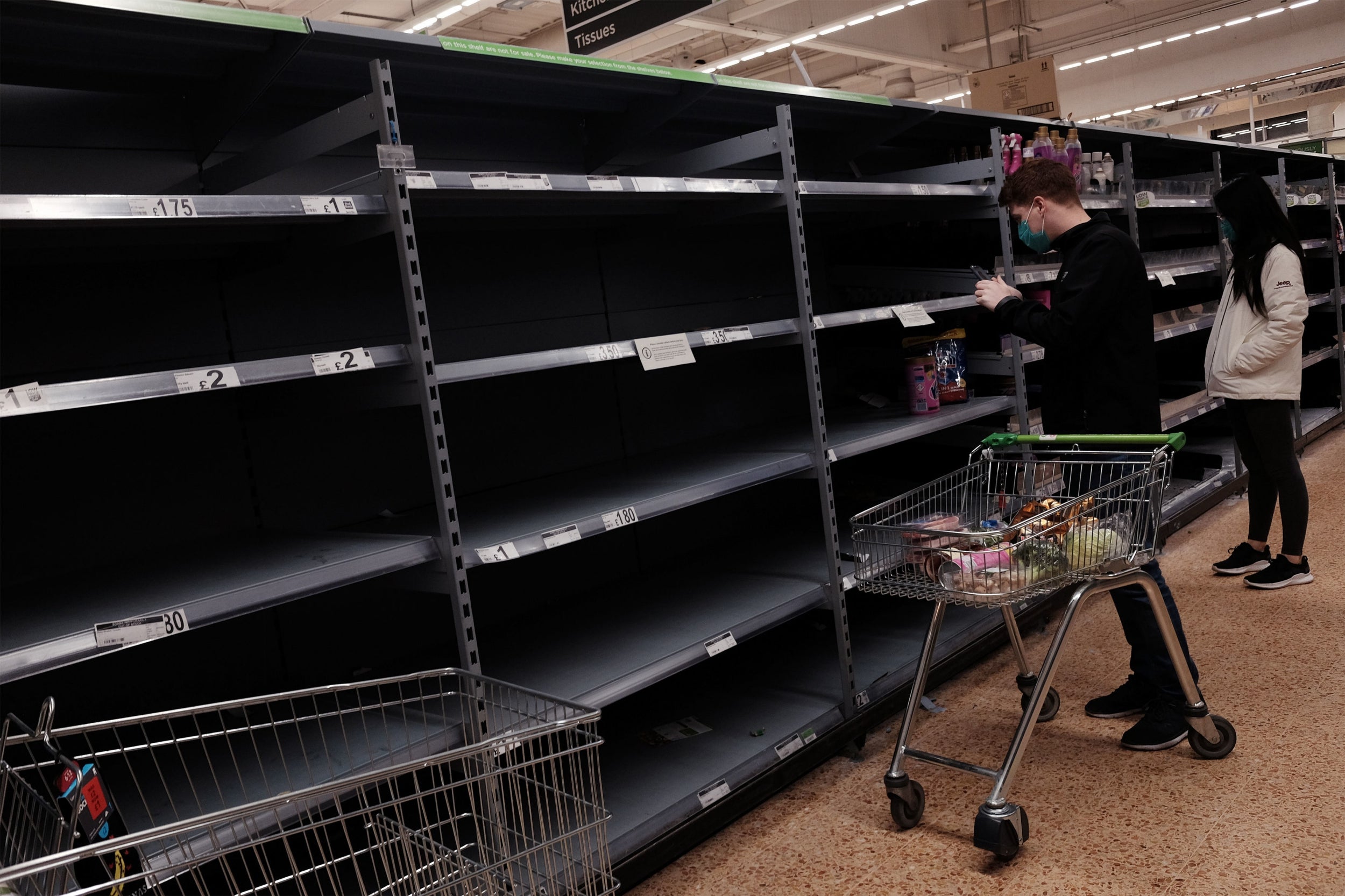
34/51 14 March 2020
Empty shelves in the laundry aisle of an Asda store in London
PA

35/51 13 March 2020
Runners and riders compete in the JCB Triumph Hurdle during day four of the Cheltenham Festival at Cheltenham Racecourse. Thousands of people attended where Gold Cup day amid great uncertainty as sports events up and down the United Kingdom are postponed and cancelled due to the Coronavirus outbreak
PA Images via Reuters Connect
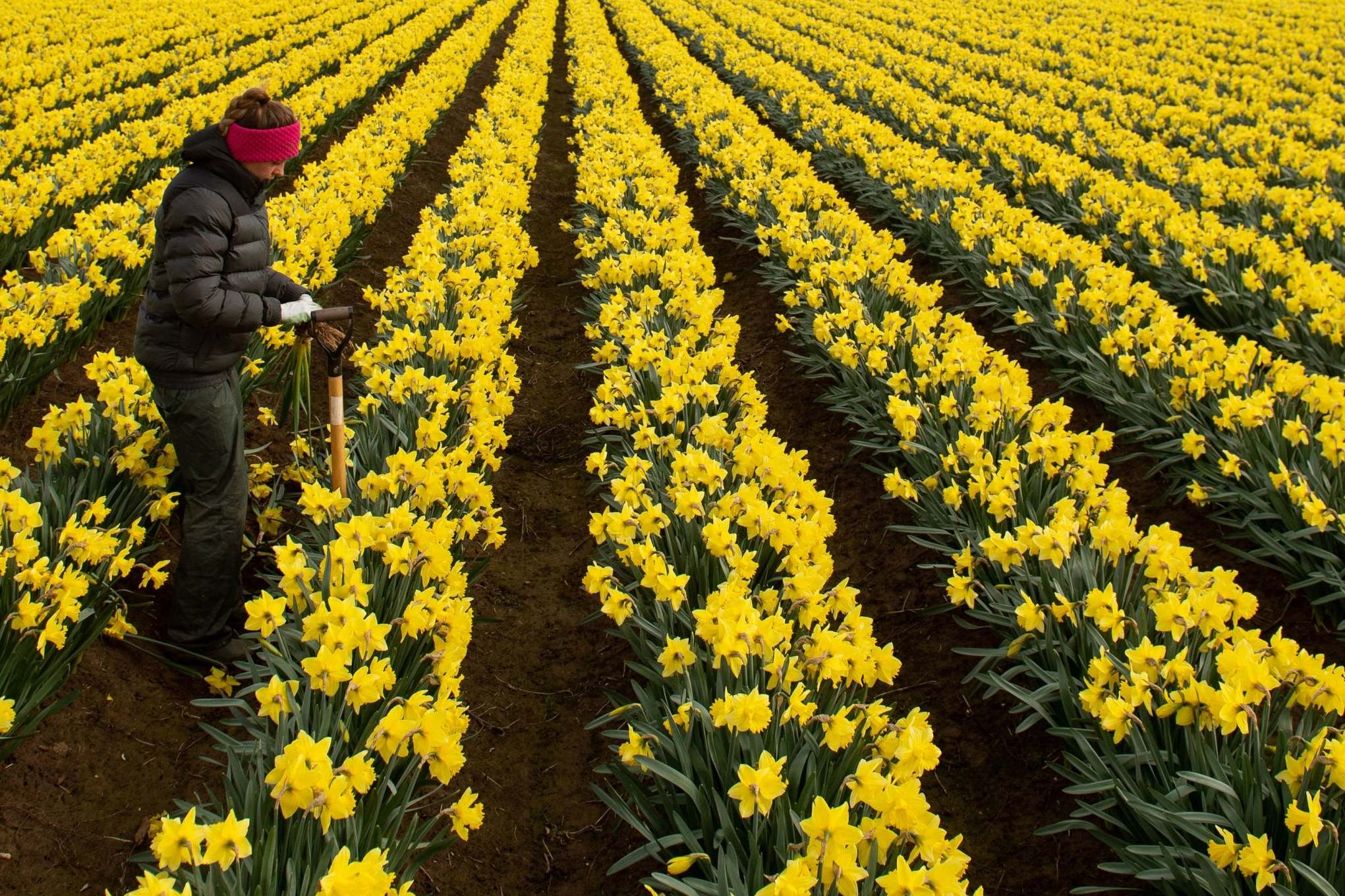
36/51 12 March 2020
A worker makes her way along rows of daffodils, removing any rogue varieties, at Taylors Bulbs in Holbeach, Lincolnshire. The fourth generation family company plant over 35 million bulbs every year, and have held The Royal Warrant as Bulb Growers to Her Majesty The Queen since 1985
PA
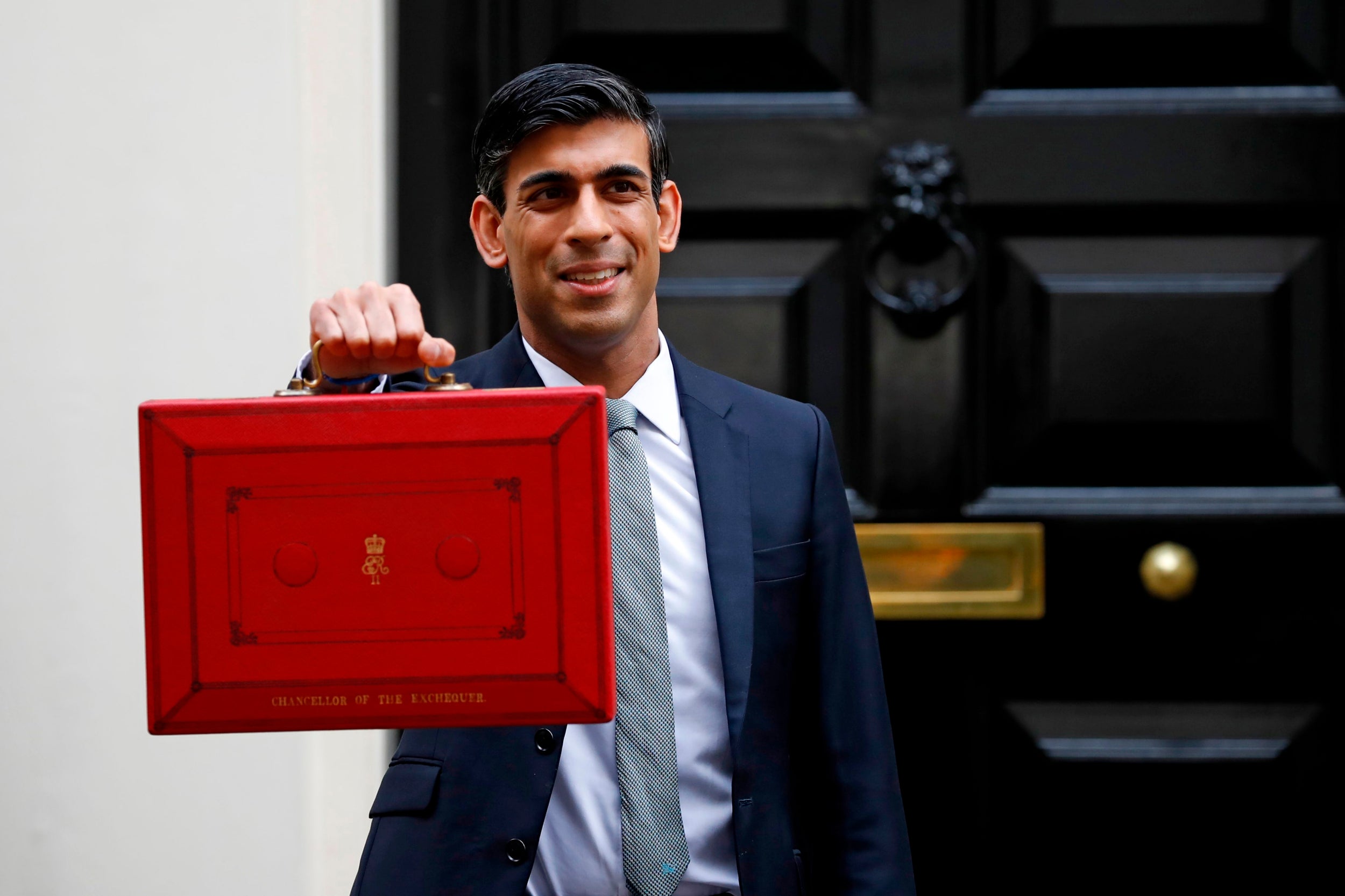
37/51 11 March 2020
Chancellor of the Exchequer Rishi Sunak poses for pictures with the Budget Box outside 11 Downing Street ahead of Britain’s first post-Brexit budget
AFP/Getty
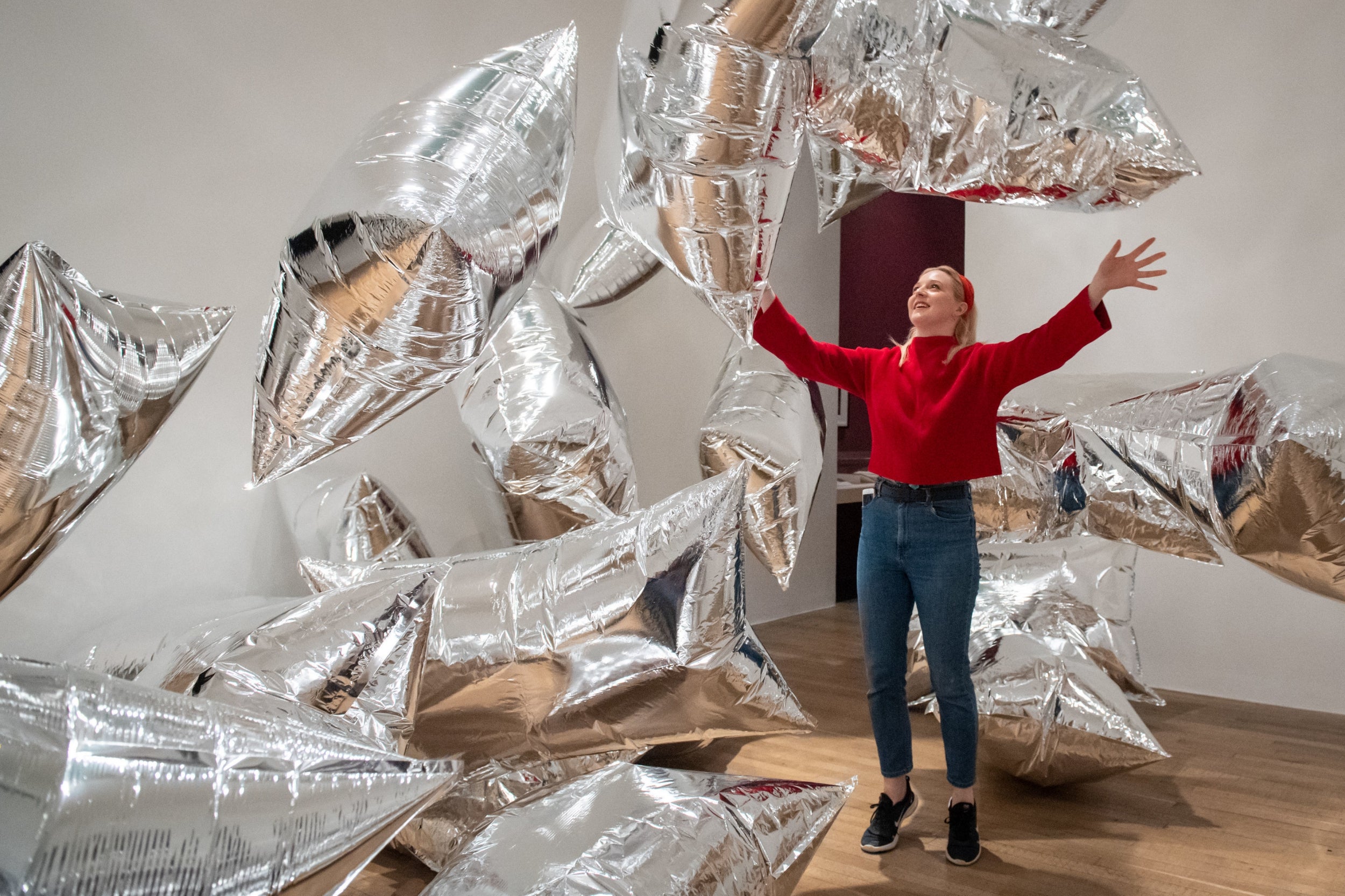
38/51 10 March 2020
A Tate Modern gallery assistant interacts with the ‘Silver Clouds’ installation, at a press view of major new Andy Warhol exhibition at Tate Modern, which features classic pop art pieces and works never shown before in the UK
PA
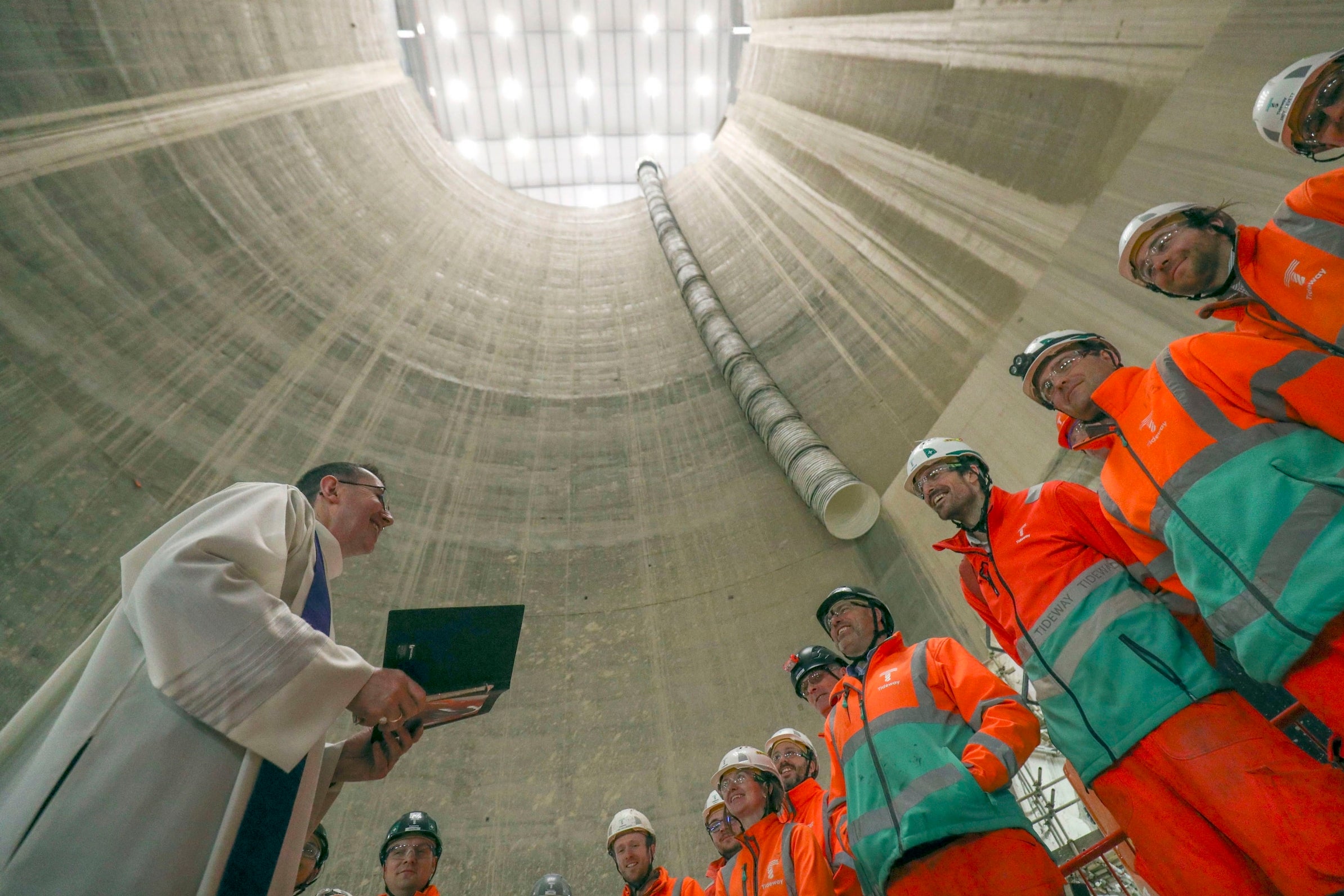
39/51 9 March 2020
The Sub Dean and Canon Paster of Southwark, Canon Michael Rawson, left, blesses the statue of Santa Barbara and workers on one of the sites of the Thames Tideway Tunnel in London. Santa Barbara is the patron saint of tunnellers and by tradition a statue and shrine to her is placed at tunnel portals and the entrance to long tunnel headings to keep workers safe while underground. The 16 mile-long Thames Tideway Tunnel will prevent tens of millions of tonnes of sewage and rainwater run-off entering the river every year
PA
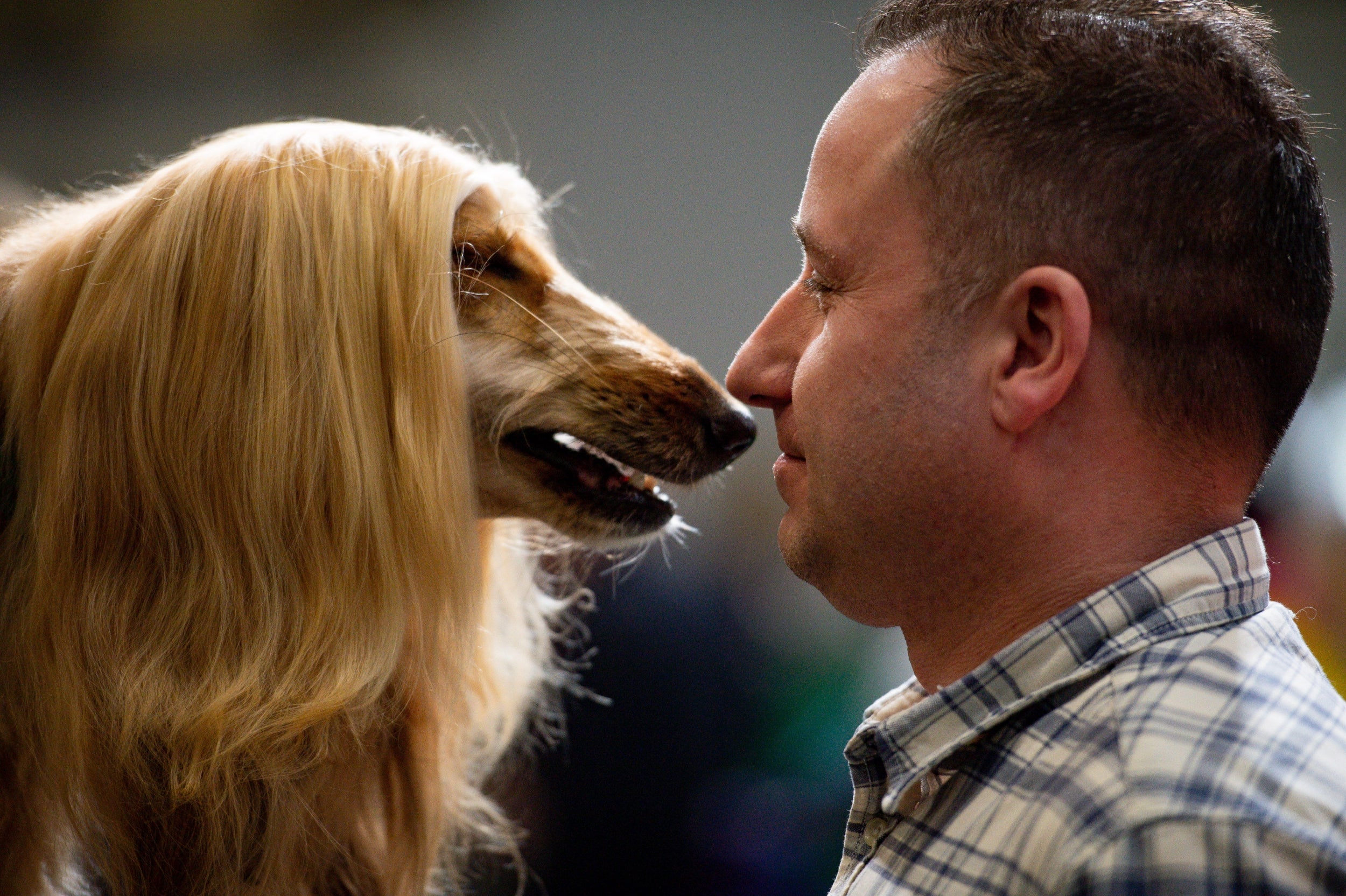
40/51 8 March 2020
An Afghan Hound dog is prepared for show at the Birmingham National Exhibition Centre (NEC) during the final day of the Crufts Dog Show
PA
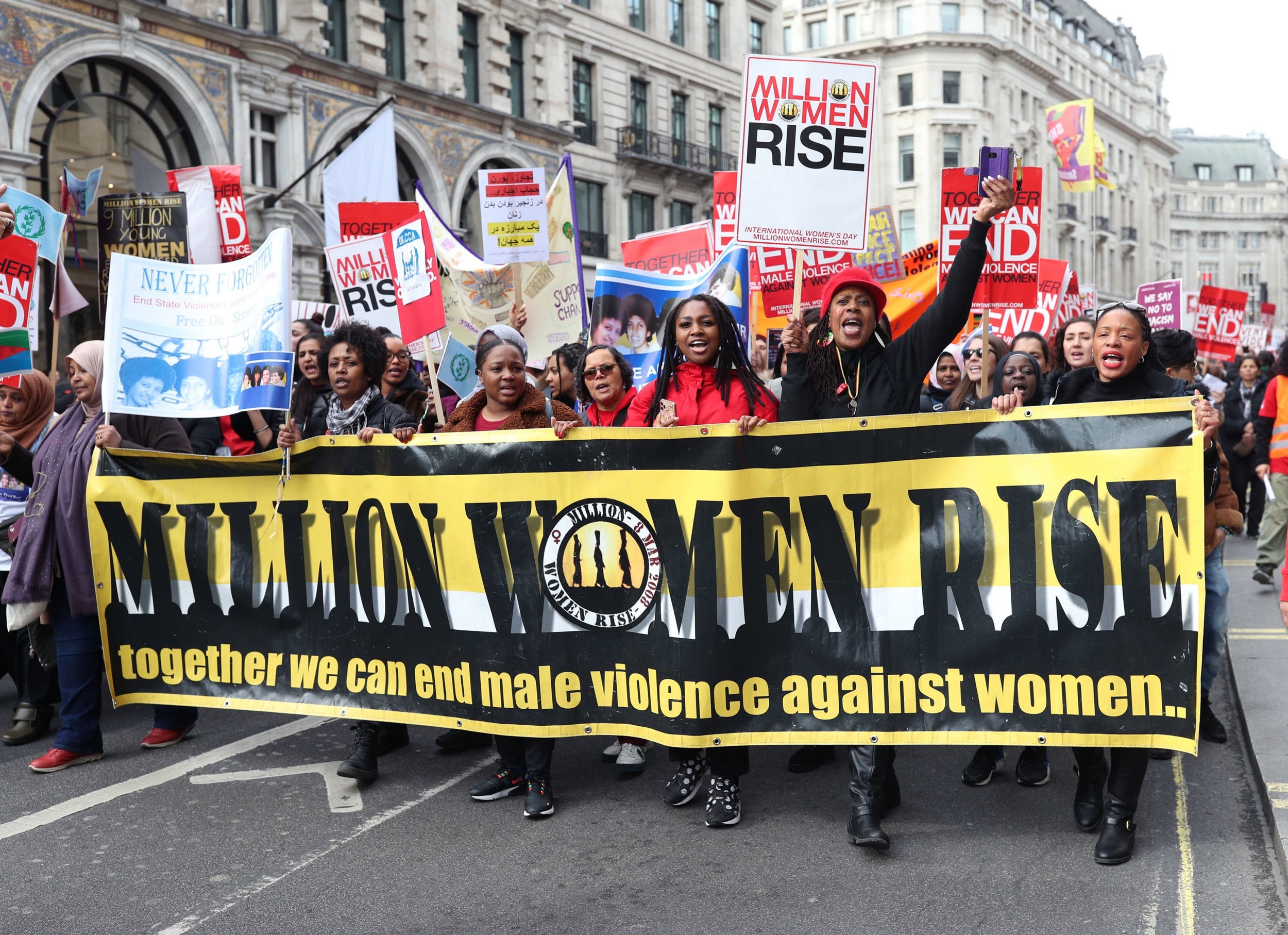
41/51 7 March 2020
People taking part in the Million Women Rise march through central London, to demand an end to male violence against women and girls in all its forms
PA
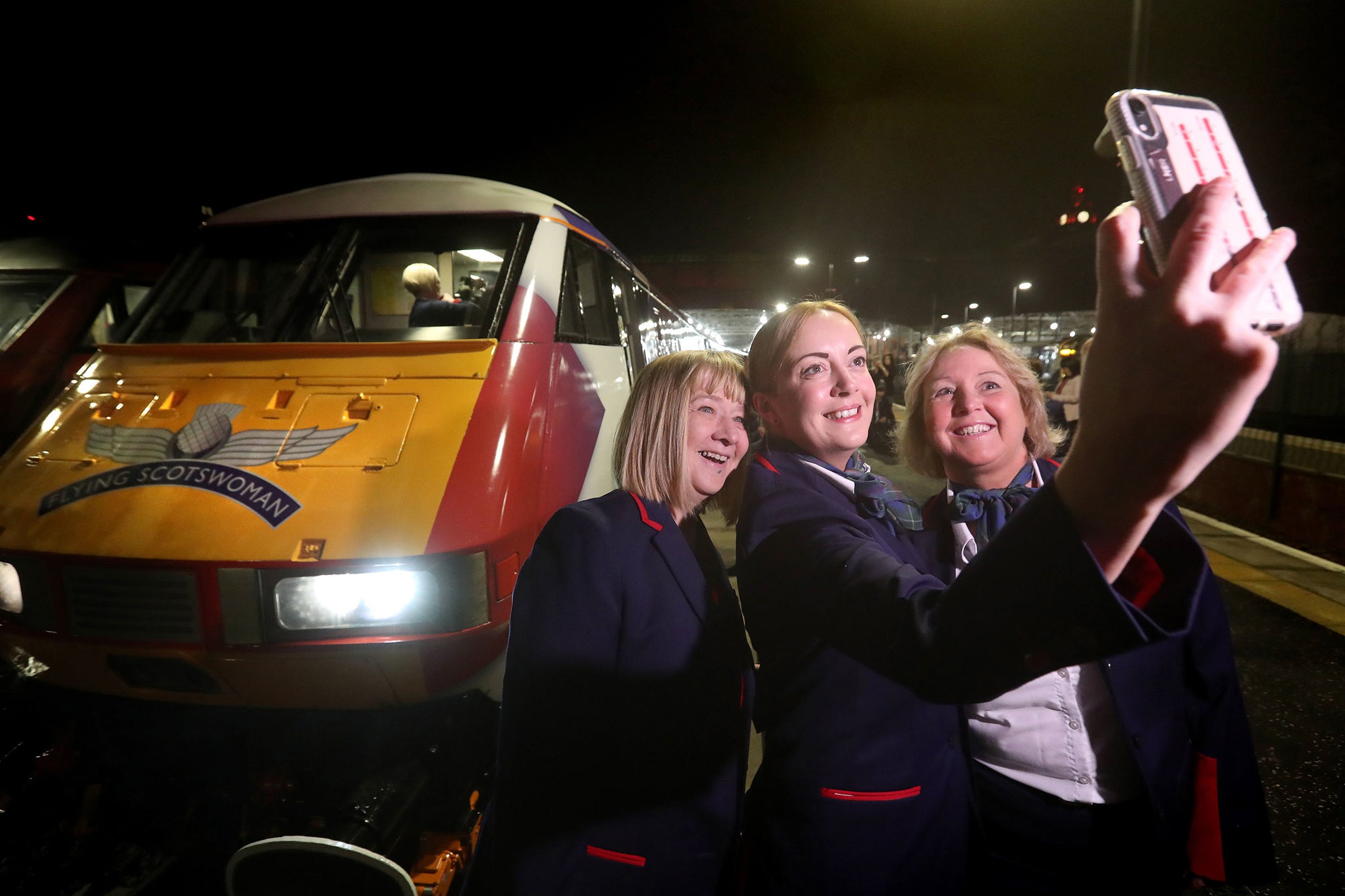
42/51 6 March 2020
Crew members take a selfie beside the cab of The Flying Scotswoman, the LNER Edinburgh to London rail service which has an all-female crew to celebrate International Women’s Day, before it departs Edinburgh Waverley station
PA
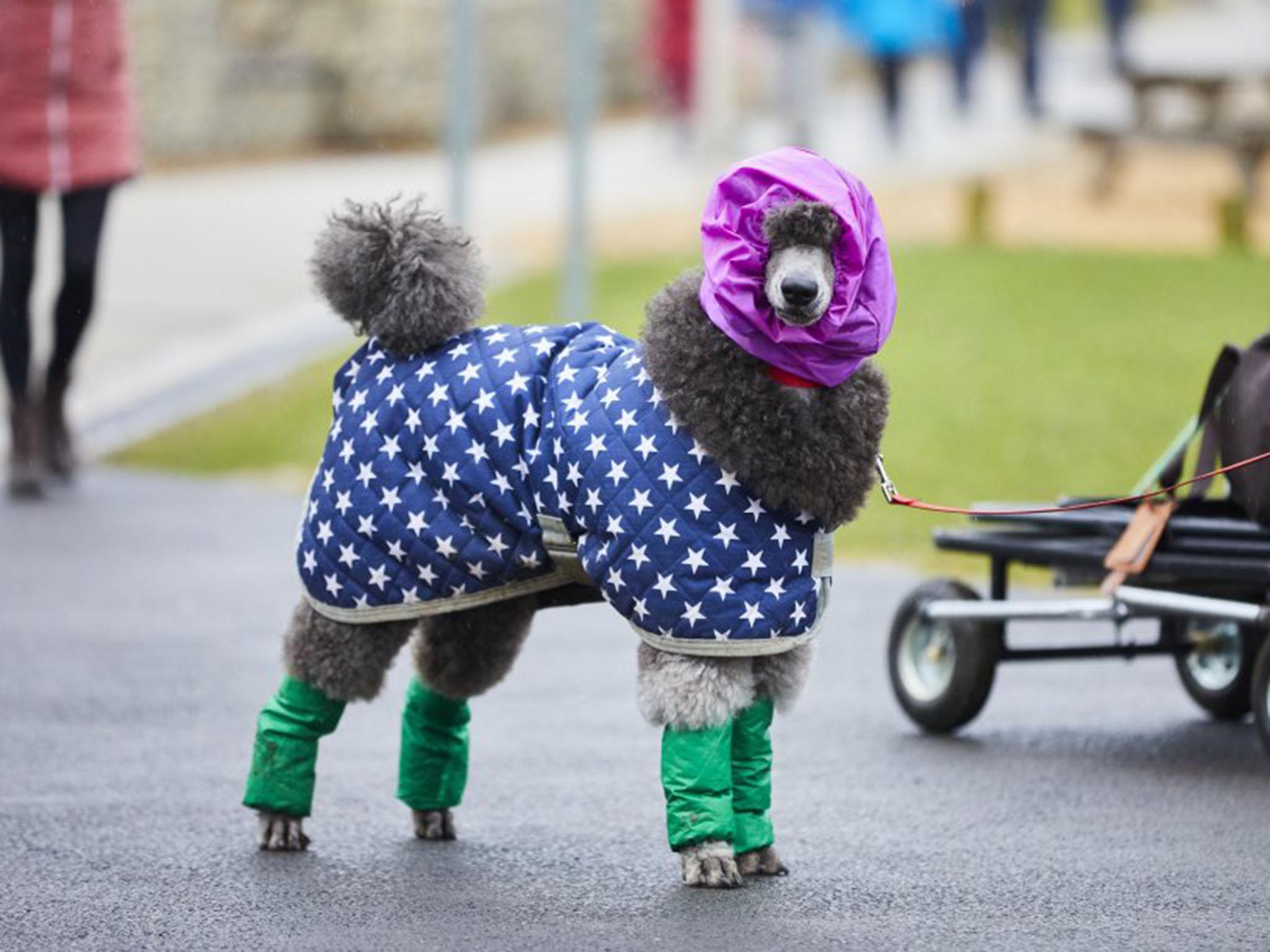
43/51 5 March 2020
A poodle arrives for the first day of Crufts 2020 in Birmingham
Jason Skarratt/Flick.digital
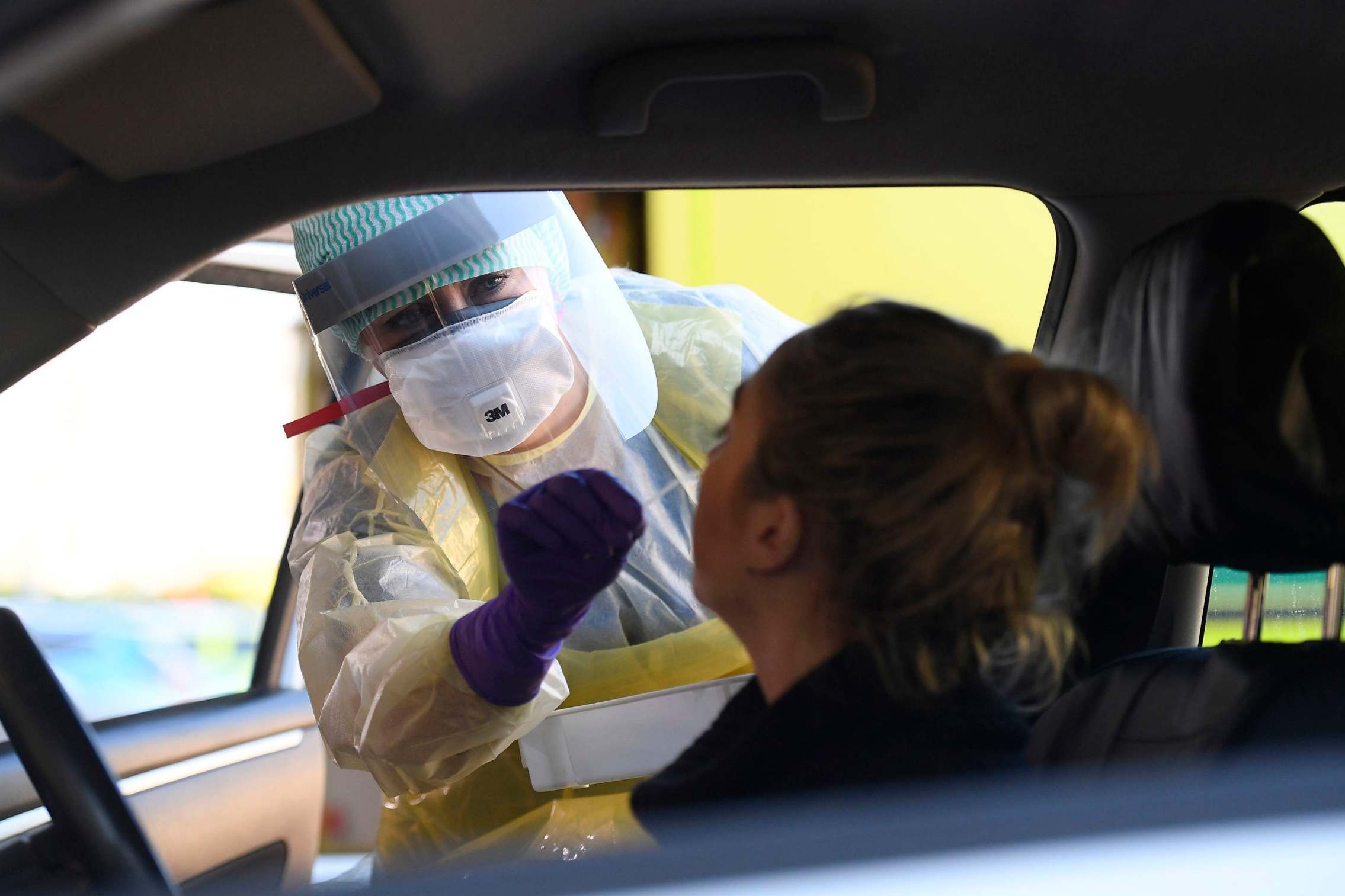
44/51 4 March 2020
An Emergency Department Nurse during a demonstration of the Coronavirus pod and Covid-19 virus testing procedures set-up beside the Emergency Department of Antrim Area Hospital in Northern Ireland
PA
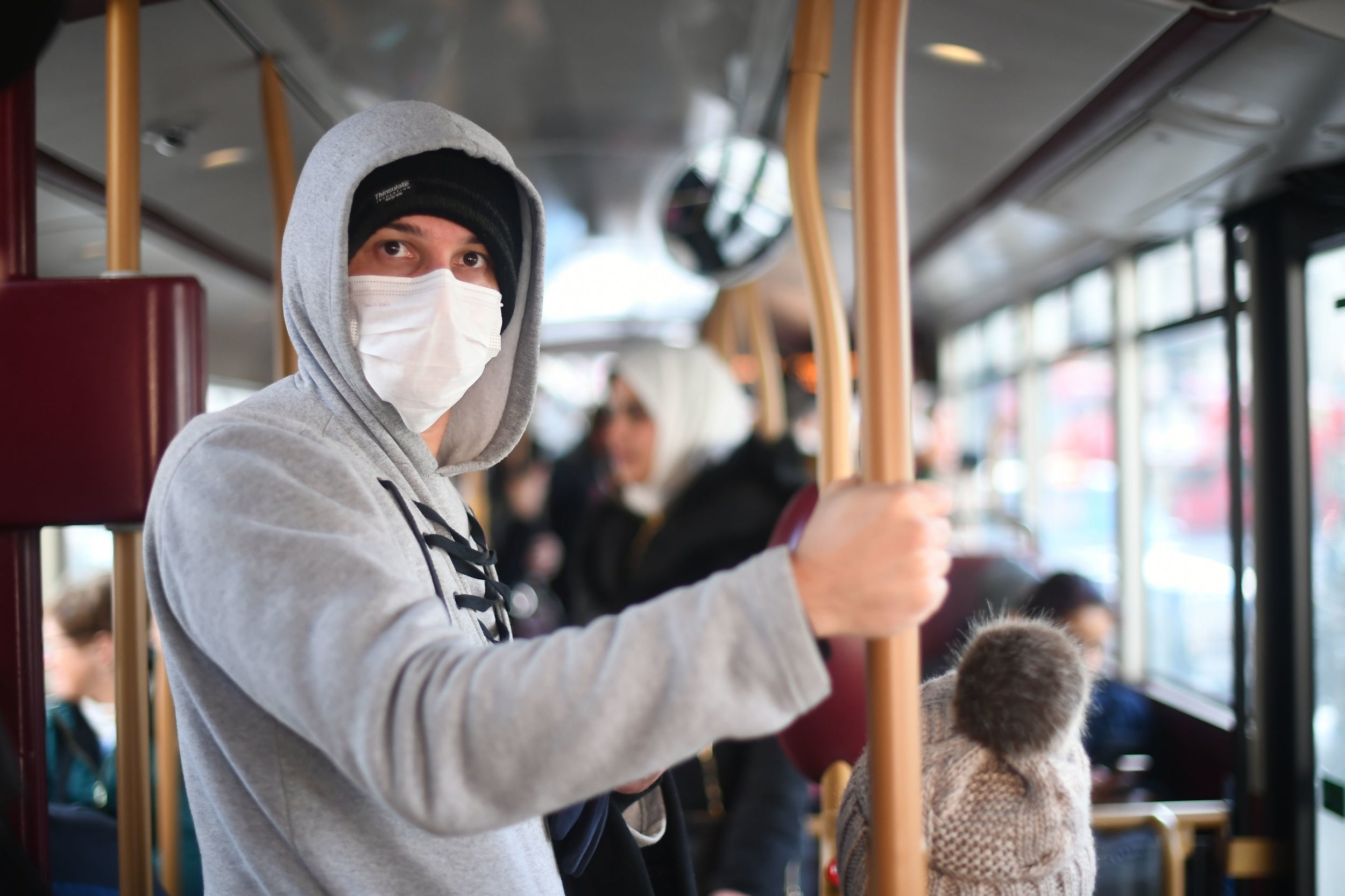
45/51 3 March 2020
A pedestrian wears a protective facemask while taking a bus in Westminster, London, on the day that Health Secretary Matt Hancock said that the number of people diagnosed with coronavirus in the UK has risen to 51
PA
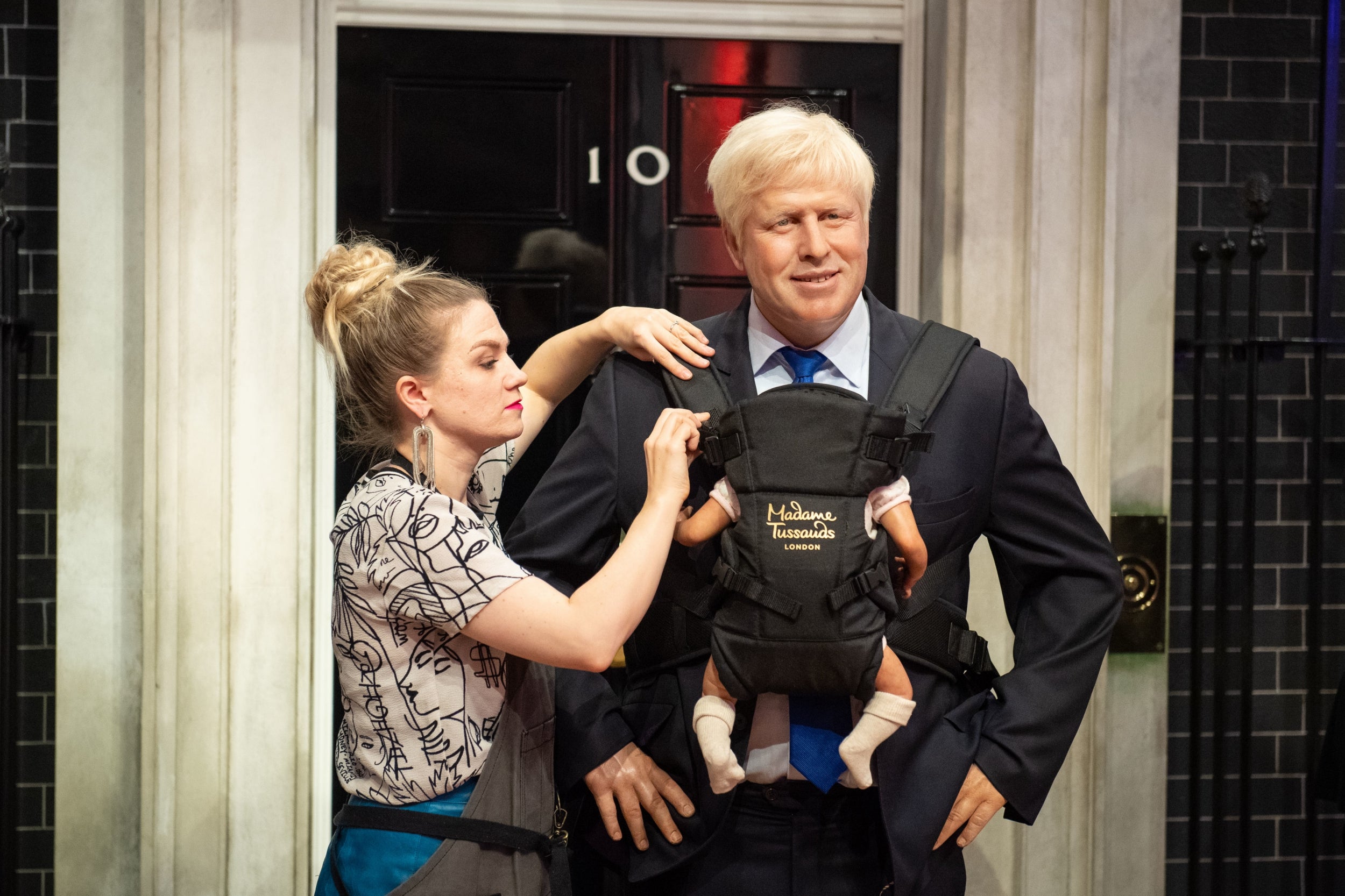
46/51 2 March 2020
An artist at Madame Tussauds in London fits the museum’s waxwork of Prime Minister Boris Johnson with a baby carrier, following the recent announcement that he is expecting a baby with partner Carrie Symonds
PA
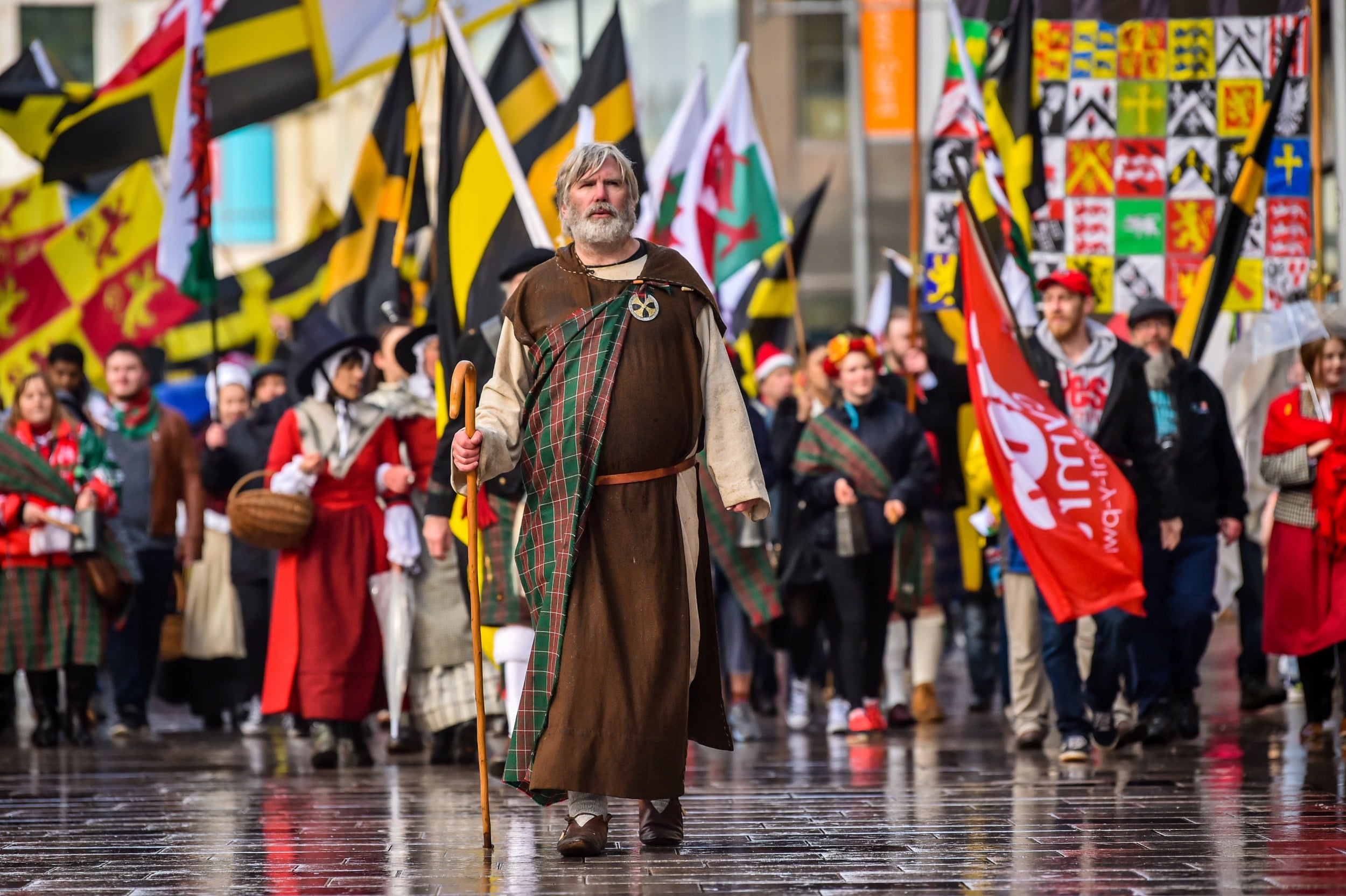
47/51 1 March 2020
A man dressed as Dewi Sant leads the St David’s day parade in Cardiff, where hundreds of people march through the city in celebration of the patron saint of Wales. Dewi Sant (Saint David in English) was the Welsh bishop of Mynyw (now St Davids) during the 6th century
PA
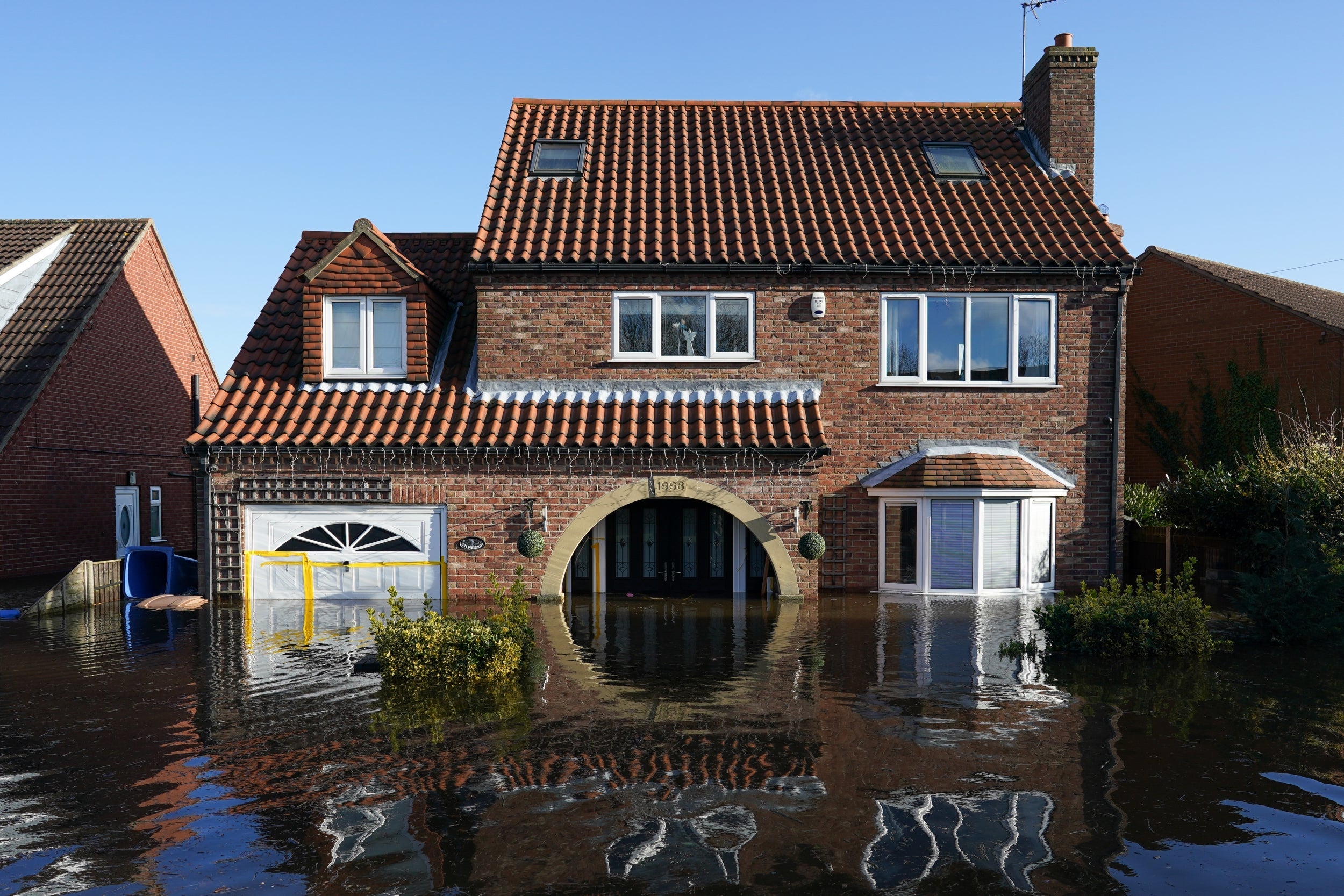
48/51 29 February 2020
A home flooded after the River Aire burst its banks in East Cowick, East Yorkshire
Getty

49/51 28 February 2020
Swedish climate activist Greta Thunberg takes part in a “Youth Strike 4 Climate” protest march in Bristol, south west England. “Activism works, so I ask you to act,” she said
AFP/Getty
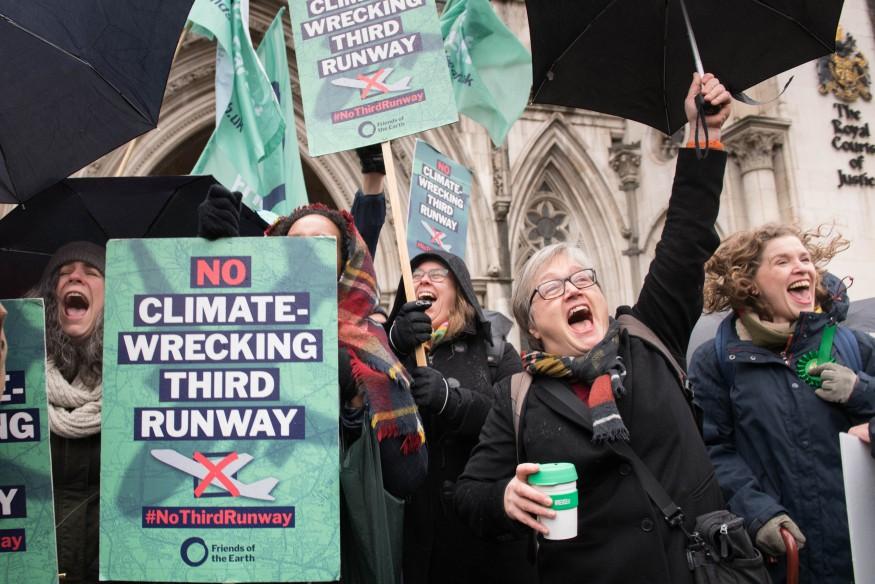
50/51 27 February 2020
Campaigners cheer outside the Royal Courts of Justice in London after they won a Court of Appeal challenge against controversial plans for a third runway at Heathrow
PA

51/51 26 February 2020
Temporary barriers have been overwhelmed by flood water in Bewdley, Shropshire
Getty

1/51 16 April 2020
A woman wearing a protective face mask and gloves walks past graffiti in Bow, as the spread of the coronavirus disease (COVID-19) continues, London, Britain, April 16, 2020
REUTERS

2/51 15 April 2020
A burned down mobile phone mast in London.According to reports, at least 20 mobile phone masts across Britain are believed to have been vandalised and government and telecom sources are increasingly concerned about the impact of conspiracy theories linking coronavirus to 5G networks
EPA

3/51 14 April 2020
The new Nightingale Hospital in Washington, Tyne and Wear, being fitted out
PA

4/51 13 April 2020
Walkers enjoy the bluebells in Wanstead Park in London
PA

5/51 12 April 2020
A woman prays at the closed doors of Westminster Cathedral ahead of the Easter morning mass, London, as the UK continues in lockdown to help curb the spread of the coronavirus. Churches across the country have been continuing to broadcast services digitally in the lead-up to Easter, with more than 1,000 livestreams taking place on a regular basis
PA

6/51 11 April 2020
A man jogs on an empty beach in Scarborough as the UK continues in lockdown to help curb the spread of the coronavirus
PA

7/51 10 April 2020
Military personnel testing people at a coronavirus test centre in the car park of Chessington World of Adventures
Reuters

8/51 9 April 2020
Posters drawn by children displayed in support of the NHS in a building near St Thomas’ Hospital in London
Getty

9/51 8 April 2020
A street cleaner in front of Coronavirus messaging on Picadilly Circus in London
Getty

10/51 7 April 2020
A jogger on the Millennium Bridge in London, as the UK continues in lockdown to help curb the spread of the coronavirus
PA

11/51 6 April 2020
A Royal Signals soldier practices during training held by the British Army. They are preparing them to support the Welsh Ambulance Service NHS Trust in the battle against coronavirus
Ministry of Defence/Reuters

12/51 5 April 2020
A police officer advises a woman to go home after spotting her enjoying the sun in Primrose Hill, London
AP

13/51 4 March 2020
New Leader of the Labour Party Keir Starmer speaks on the announcement of his victory in the leadership race of the Labour Party
AFP via Getty

14/51 3 April 2020
Health Secretary Matt Hancock and NHS staff stand on marks on the ground, put in place to ensure social distancing guidelines are adhered to, at the opening of the NHS Nightingale Hospital at the ExCel centre in London, a temporary hospital with 4000 beds which has been set up for the treatment of Covid-19 patients. PA Photo. Picture date: Friday April 3, 2020. Split into more than 80 wards containing 42 beds each, the facility will be used to treat Covid-19 patients who have been transferred from other intensive care units across London.
PA

15/51 2 April 2020
A child at Westlands Primary School paints a poster in support of the NHS in Newcastle-under-Lyme
Reuters

16/51 1 April 2020
Staff wearing PPE of gloves and face masks, as a preactionary measure against Covid-19, disinfect an ambulance after it arrived with a patient at St Thomas’ Hospital in north London
AFP via Getty

17/51 31 March 2020
Llandudno Pier remains closed and deserted of tourists during the pandemic lockdown in Wales
Getty

18/51 30 March 2020
Waves break against the pier at Tynemouth, on the North East coast
PA

19/51 29 March 2020
Waves crash over a car on the seafront during windy conditions in Broadstairs, Kent
PA

20/51 28 March 2020
Derbyshire Police dye the “blue lagoon” in Harpur Hill, Buxton black, as gatherings there are “dangerous” and are “in contravention of the current instruction of the UK Government”
PA

21/51 27 March 2020
A road sign advising drivers to ‘stay home protect NHS saves lives’ is visible on the M80 near Banknock as the UK continues in lockdown to help curb the spread of the coronavirus
PA

22/51 26 March 2020
A postman wears a mask and gloves to deliver letters in Broadstairs, Kent, after Prime Minister Boris Johnson has put the UK in lockdown to help curb the spread of the coronavirus. PA Photo. Picture date: Thursday March 26, 2020. The UK’s coronavirus death toll reached 463 on Wednesday.
PA

23/51 25 March 2020
Members of the public out exercising on Brighton beach at sunset
Getty

24/51 24 March 2020
Military vehicles cross Westminster Bridge after members of the 101 Logistic Brigade delivered a consignment of medical masks to St Thomas’ hospital
Getty

25/51 23 March 2020
Commuters travel on the London underground during the Coronavirus pandemic
Getty

26/51 22 March 2020
People walk on the seafront after recent incidents of members of the public ignoring government advice on social distancing on in Hove
Getty

27/51 21 March 2020
A general view of an empty Trafalgar Square in London. There have as of now been 3,983 diagnosed coronavirus cases in the UK and 177 deaths
Getty

28/51 20 March 2020
Swans swim on the banks of the River Severn in Worcester
PA

29/51 19 March 2020
A piece of art by the artist, known as the Rebel Bear has appeared on a wall on Bank Street in Glasgow. The new addition to Glasgow’s street art is capturing the global Coronavirus crisis. The piece features a woman and a man pulling back to give each other a kiss
PA

30/51 18 March 2020
Students tend to Spring Lambs at Moreton Morrell College in Warwickshire
PA

31/51 17 March 2020
Caerphilly Castle in South Wales joins Tourism Ireland’s Global Greenings campaign to mark St Patrick’s Day
PA

32/51 16 March 2020
Shoppers form long queues ahead of the opening of a Costco wholesale store in Chingford
Getty

33/51 15 March 2020
Players sing songs in the changing room after their game of football at Hackney Marshes in London
Reuters

34/51 14 March 2020
Empty shelves in the laundry aisle of an Asda store in London
PA

35/51 13 March 2020
Runners and riders compete in the JCB Triumph Hurdle during day four of the Cheltenham Festival at Cheltenham Racecourse. Thousands of people attended where Gold Cup day amid great uncertainty as sports events up and down the United Kingdom are postponed and cancelled due to the Coronavirus outbreak
PA Images via Reuters Connect

36/51 12 March 2020
A worker makes her way along rows of daffodils, removing any rogue varieties, at Taylors Bulbs in Holbeach, Lincolnshire. The fourth generation family company plant over 35 million bulbs every year, and have held The Royal Warrant as Bulb Growers to Her Majesty The Queen since 1985
PA

37/51 11 March 2020
Chancellor of the Exchequer Rishi Sunak poses for pictures with the Budget Box outside 11 Downing Street ahead of Britain’s first post-Brexit budget
AFP/Getty

38/51 10 March 2020
A Tate Modern gallery assistant interacts with the ‘Silver Clouds’ installation, at a press view of major new Andy Warhol exhibition at Tate Modern, which features classic pop art pieces and works never shown before in the UK
PA

39/51 9 March 2020
The Sub Dean and Canon Paster of Southwark, Canon Michael Rawson, left, blesses the statue of Santa Barbara and workers on one of the sites of the Thames Tideway Tunnel in London. Santa Barbara is the patron saint of tunnellers and by tradition a statue and shrine to her is placed at tunnel portals and the entrance to long tunnel headings to keep workers safe while underground. The 16 mile-long Thames Tideway Tunnel will prevent tens of millions of tonnes of sewage and rainwater run-off entering the river every year
PA

40/51 8 March 2020
An Afghan Hound dog is prepared for show at the Birmingham National Exhibition Centre (NEC) during the final day of the Crufts Dog Show
PA

41/51 7 March 2020
People taking part in the Million Women Rise march through central London, to demand an end to male violence against women and girls in all its forms
PA

42/51 6 March 2020
Crew members take a selfie beside the cab of The Flying Scotswoman, the LNER Edinburgh to London rail service which has an all-female crew to celebrate International Women’s Day, before it departs Edinburgh Waverley station
PA

43/51 5 March 2020
A poodle arrives for the first day of Crufts 2020 in Birmingham
Jason Skarratt/Flick.digital

44/51 4 March 2020
An Emergency Department Nurse during a demonstration of the Coronavirus pod and Covid-19 virus testing procedures set-up beside the Emergency Department of Antrim Area Hospital in Northern Ireland
PA

45/51 3 March 2020
A pedestrian wears a protective facemask while taking a bus in Westminster, London, on the day that Health Secretary Matt Hancock said that the number of people diagnosed with coronavirus in the UK has risen to 51
PA

46/51 2 March 2020
An artist at Madame Tussauds in London fits the museum’s waxwork of Prime Minister Boris Johnson with a baby carrier, following the recent announcement that he is expecting a baby with partner Carrie Symonds
PA

47/51 1 March 2020
A man dressed as Dewi Sant leads the St David’s day parade in Cardiff, where hundreds of people march through the city in celebration of the patron saint of Wales. Dewi Sant (Saint David in English) was the Welsh bishop of Mynyw (now St Davids) during the 6th century
PA

48/51 29 February 2020
A home flooded after the River Aire burst its banks in East Cowick, East Yorkshire
Getty

49/51 28 February 2020
Swedish climate activist Greta Thunberg takes part in a “Youth Strike 4 Climate” protest march in Bristol, south west England. “Activism works, so I ask you to act,” she said
AFP/Getty

50/51 27 February 2020
Campaigners cheer outside the Royal Courts of Justice in London after they won a Court of Appeal challenge against controversial plans for a third runway at Heathrow
PA

51/51 26 February 2020
Temporary barriers have been overwhelmed by flood water in Bewdley, Shropshire
Getty
Announcing the creation of the new taskforce at Downing Street, the business secretary, Alok Sharma, said that he could not set a timescale for the creation of a vaccine.
“We cannot put a date on when we will get a vaccine,” said Mr Sharma. “But we live in a country with a rich history of pioneering science, and with the government backing our scientists, we have the best chance to do this as quickly as possible.”
Sir Patrick said that there were more than 100 vaccine projects under way around the world, but he cautioned that it could take some time to find a vaccine that was effective and safe.
“We’ve got to get a vaccine and that isn’t two days away and it isn’t two months away,” he said. “Making a vaccine is a difficult, complicated process. It doesn’t only have to work, it has to be safe. And for a disease like this it has to be very safe, if you are going to use it right across the population. There’s a lot to do before we are in that position.”
He added: “Each single project doesn’t have a high probability of success. So although everyone goes into it with great enthusiasm and we hope they work, it is never the case that we know we are going to get a vaccine that is going to work.”
The latest news on Brexit, politics and beyond direct to your inbox
Britain must not rely only on homegrown research projects in universities such as Oxford and London Imperial but must be ready to take advantage of products developed overseas, he said.
“This is going to come from somewhere,” he said. “ We just need to back lots of horses at the moment and make sure we are in a great position to access a vaccine when it occurs.”
Asked who would be given priority to receive a vaccine when it is ready, Sir Patrick said: “It’s going to be important that we vaccinate in the way we normally do for these diseases, which is to make sure that the vulnerable are protected and then to roll out to wider vaccination, but that is some way off.”
Mr Sharma added: “UK scientists are working as fast as they can to find a vaccine that fights coronavirus, saving and protecting people’s lives. We stand firmly behind them in their efforts.
“The Vaccine Taskforce is key to coordinating efforts to rapidly accelerate the development and manufacture of a potential new vaccine, so we can make sure it is widely available to patients as soon as possible.”
Mr Sharma also announced 21 new research projects to receive funds from a £14m government pot for the development of treatments and vaccines.
These include:
- An Oxford University project to trial an anti-malarial drug with anti-inflammatory properties in order to determine whether it can reduce the harm of Covid-19 to high-risk patients;
- Imperial College London tests on a potential vaccine designed to stimulate the body’s production of protective antibodies;
- A Public Health England effort to develop a new antibody that could offer protection against infection and disease progression;
- A Public Health England study into the transmission of Covid-19 on materials found in hospitals and households, including fabric, plastics, metals and ceramics.
Joining Sir Patrick and Prof Van-Tam on the taskforce are representatives from government, academia and industry, including the government’s life science champion Sir John Bell, drugs giant AstraZeneca and the Wellcome Trust.
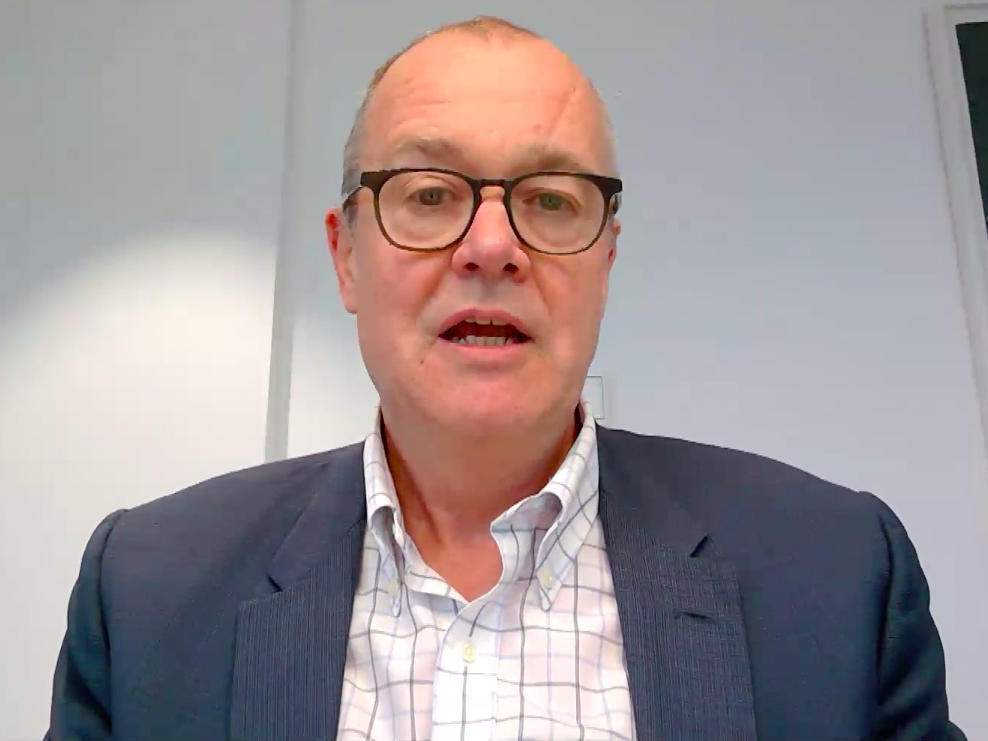
They will aim to make the UK a leader in clinical vaccine testing and manufacturing, building on existing research and development expertise.
The health secretary, Matt Hancock, said: “We’re doing everything possible to save lives and beat this disease, and that includes working flat out with businesses, researchers and industry to find a vaccine as quickly as possible.
“The UK is world-leading in developing vaccines. We are the biggest contributor to the global effort and are preparing to ensure we can manufacture vaccines here at home as soon as practically possible.”
The chief medical officer, Chris Whitty, said: “The UK has some of the best vaccine scientists in the world, but we need to take account of the whole development process. This taskforce will ensure the UK can take an end-to-end view. This includes funding research … and ensuring manufacturing capability to deliver a Covid-19 vaccination as quickly as possible.”



